#episode: morale victory
Text
The Union could win against the Moclan-Krill conflict by getting all the Moclans hooked onto nicotine.
#cue the episode's moral dilemma:#is it right to get the enemy dependent on a substance for the chance of victory#the orville#the orville new horizons#scifi#science fiction
19 notes
·
View notes
Text
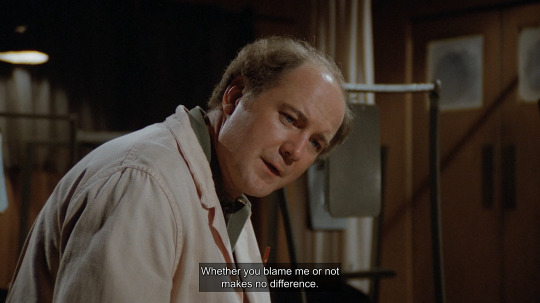
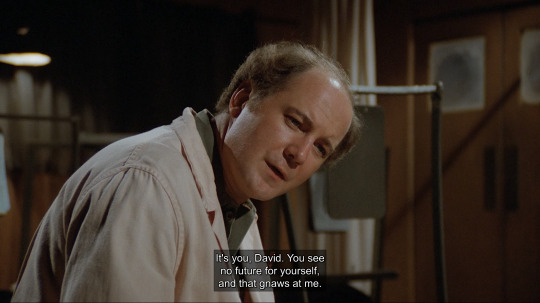
#the thing is that i am in love with him#this was an episode that so tremendously showed his growth from the charles we met in early s6 and i'm so soft#charles winchester#charles emerson winchester iii#m*a*s*h#mashposting#mashblogging#morale victory#s8e19#.
25 notes
·
View notes
Note
Your atla analysis is the best so I wanted to ask your opinion on something I've found the fandom fairly divided on - what did you think of Azula's ending within the show proper? Unnecessarily cruel or a necessary tragedy? Would you say that her mental breakdown was too conveniently brought about in order to 'nerf' her for the final agni kai? Also, do you think it was 'right' for Zuko to have fought with his sister at all or would it have been better for him to seek a more humane way to end the cycle of violence?
okay so im saying this as someone who loves azula to death like she has always been one of my absolute favorite characters ever since i was a kid and i’ve always vastly preferred her to zuko and found her to be extremely compelling and eminently sympathetic. i am saying this now before the azula stans come for me. i believe in their beliefs. but i also think her downfall is perfectly executed, and putting aside all the bullshit with the comics and whatever else, it’s a really powerful conclusion to her arc. obviously that isn’t to say that she wouldn’t continue to grow and develop in a postcanon scenario (i have a whole recovery arc for her mapped out in my head, like i do believe in her Healing Journey) but from a narrative perspective, her telos is in fact very thematically satisfying.
no, she wasn’t nerfed so that they could beat her in a fight. the fact that she falls apart is what makes them feel that they can confidently take her on (although i do think in a fair fight katara could win anyway), but the whole point is that it’s not about winning or losing in combat. the whole point is that zuko and azula being pitted against each other in this gratuitous ritual of violence as the culmination of their arcs is fundamentally tragic. yes it’s a bad decision to fight her, and zuko should have chosen another path, but the whole point is that he’s flawed and can only subscribe to the logic he has spent his whole life internalizing through violence and abuse.
that’s why aang’s fight against ozai, while tragic in its own way, is also a triumph for the way in which his ideals prevail in the face of genocide, while zuko and azula’s fight is very patently tragic. there is no moment of victory or triumph. even as zuko sacrifices himself in a beautiful mirroring of “the crossroads of destiny” and as katara uses the element of her people combined with techniques across other cultures to use azula’s hubris and ideology of domination against her, it’s presented as moments of personal growth occurring within a very tragic yet inevitable situation. it was inevitable because azula had always been positioned as an extension of her father, and thus to disempower ozai also means disempowering azula, his favorite site of projection, his favorite weapon.
yeah, it does rub me the wrong way when zuko asks katara whether she’d like to help him “put azula in her place.” it’s not a kind way to talk about your abused younger sister. but it’s also important to understand that zuko doesn’t really recognize his sister’s pain, despite the fact that they obviously share a father, because he’s always assumed that she was untouchable as their perfect golden child and thus never a victim. and he’s wrong. zuko and katara expect a battle of triumph and glory, noble heroes fighting valiantly so that good may prevail over evil. but as they discover here, even more so than their previous discovery two episodes prior, a battle is not a legendary event filled with bombast and beauty until after it has been historicized. often a war is simply fought between pathetic, desperate people who see no other option but to fight.
aang’s ultimate refusal to fight despite having all the power in the world is what makes him so important as the protagonist. but katara and zuko both share a more simplistic view of morality and what it means to be good. and zuko assumes that by fighting azula, he can only be punching up, because she has always been positioned as his superior, and she (in her own words!) is a “monster.” and then azula loses, and his entire worldview shatters. joking about putting her in her place makes way for the realization that behind all her posturing and lying (to herself more than anyone) and performance and cognitive dissonance, azula has always been broken, perhaps even more than he is.
azula says “im sorry it has to end this way, brother,” to which zuko replies “no you’re not.” but i think azula is truly sorry, because in her ideal world, she wouldn’t be fighting zuko. she doesn’t actually want to kill him, as much as she claims to. she’s already reached the conclusion that zuko will only truly reach once their fight is over. she lacks a support system, and she needs one, desperately. if she could somehow get her family back, do everything differently, less afraid of the consequences, she would. she’s smirking, she sounds almost facetious, but really, she is sorry. as of this moment, she really doesn’t want it to end this way. but zuko cannot accept that, because in his mind, azula is evil. azula has no soul nor feeling. azula always lies.
her breakdown doesn’t come out of nowhere, either. it’s precipitated by everyone she has ever cared about betraying her. first zuko betrays her, then mai, then ty lee, and then ozai — the person she has staked her entire identity to and to whom she has pledged her undying loyalty and obedience, become nothing more than a vessel for his whims — discards her because she had the audacity to care about someone other than him. what i don’t think zuko realizes, and perhaps will never realize, is that azula betrayed ozai by bringing zuko back home. he was not supposed to be brought back with honor and with glory. azula specifically orchestrated the fight in the catacombs to motivate him to join her, and it’s not because she’s some cruel sadistic monster who wanted to separate a poor innocent soft uwu bean from his loving uncle, it’s because she genuinely believes that she’s doing what’s best for him. she believes that their uncle is a traitor and a bad influence, and she believes that bringing zuko home with his honor “restored” is an act of love. to her it is.
yes, she claims that she was actually just manipulating him so that she wouldn’t have to take the fall if the avatar was actually alive, but also, she’s clearly just covering her own ass. she didn’t know about the spirit water, and only started improvising when zuko started showing hesitation. but even if she was only using zuko, then that was an insane risk to take, because either way she was lying directly to ozai’s face. and zuko admits it to ozai while simultaneously committing treason, so of course ozai would blame azula, his perfect golden child who tried to violate his decree by bringing zuko back home a prisoner at best and dead at worst, and instead found a way to restore his princehood with glory.
we only see ozai dismissing and discarding azula in the finale, but it’s clearly a tension that’s been bubbling since the day of black sun. and we know this because we do see azula falling apart before the finale. in “the boiling rock” she is betrayed by her only friends. in “the southern raiders” we see that this has taken a toll on her, that she is already somewhat unhinged. she and zuko tie in a one on one fight for the first time. and she takes down her hair as she uses her hairpin to secure herself against the edge of a cliff. unlike zuko, who is helped by his friends and allies, who has a support system. it’s a very precarious position; she’s literally on a cliff’s edge, alone, her hair down signifying her unraveling mental state. azula having her hair down signals to us an audience that she is in a position of vulnerability. she is able to mask this terrifying moment wherein she nearly plummets to her death with a triumphant smirk, but it should be evident to us all that her security is fragile here.
and the thing is, even though she’s always masked it with a smirk and perfect poise, her security has always been fragile. azula has never been safe. azula’s breakdown is simply the culmination of her realization that no matter how hard she tries, she will never be ozai’s perfect weapon, because she is a human being. she is a child, no less. and there is no one in her entire life who loves her for nothing. zuko has iroh, who affirms to him that he could never be angry with zuko, that all he wants is simply what is best for zuko. but azula doesn’t have unconditional support in her life. she doesn’t even have support.
everyone she ever thought she could trust has betrayed her, and so she yells that trust is for fools. because she feels like a fool. of course fear is the only way; it’s what kept her in line all these years. azula is someone who is ruled by fear, and who is broken by the recognition that fear isn’t enough. her downfall is necessarily tragic because her worldview is wrong. the imperialist logic of terror as a tool for domination is her own undoing, just as ozai’s undoing is losing the weapon he has staked his national identity to. it’s a battle of ideals. aang v ozai: pacifism v imperialism. katara and zuko v azula: love and support v fear and isolation.
zuko is unfair to azula, it’s true. he tries to fight her even as he can clearly recognize that “she’s slipping.” instead of trying to help his little sister, he uses that weakness to his advantage, tries to exploit her pain so that he can finally, for the first time ever, beat her in a fight. it’s cruel, but it’s also how siblings act. especially considering the conditions under which they were raised, and how zuko has always viewed her. and in zuko’s defense, she has tried to kill him multiple times lately, both in “the boiling rock” and in “the southern raiders.” zuko is someone who gets fixated on a goal and blocks out everything else, including recognition of his surroundings or empathy for others. so of course when he’s promised to put azula in her place he’s going to exploit her weaknesses to do so. after all, isn’t exploiting his weaknesses exactly what azula does best? so he allows himself to stoop to her level, and in fact only redeems himself through his sacrifice for katara. but it is when azula is chained to the grate and zuko and katara, leaning on each other, look down and observe the sheer extent on her pain, that zuko realizes that “putting azula in her place” isn’t actually a victory. it feels really, really bad, actually.
they’re in a similar position as they were when they faced yon rha. and now it is zuko’s turn to understand that he is not a storybook hero triumphing over evil, but rather a human being, facing another human being, in a conflict that is larger than themselves. to “put someone in their place” is to imply a logic of domination, of inherent superiority, that someone has stepped out of line and must be reordered neatly into the hierarchy. but aang disputes the notion, ozai’s notion, that humanity can be classified along these lines, that there exists an ontological superiority among some and not others. so operation: putting azula in her place was always going to be flawed, even if she was performing competency the way she always does, because they’re nonetheless subscribing to her logic.
of course they should be helping azula, of course they should be reaching out to abuse victims through support instead of more violence. but first they must recognize her victimhood. first they must come to understand that they didn’t get lucky, and they didn’t dominate her because they are more “powerful,” that they weren’t “putting her in her place.” they must understand that they are not heroes fighting villains in a glorious trial by combat. that the logic of the agni kai is flawed. that they are all victims. that they are all just scared, hurt children who are still grieving their mothers.
#update: ok i readmored it 👍🏼#azula#analysis#zuko#katara#ozai#azula&zuko#azula&ozai#asks#malatilata#ugh azula is such a beautiful character….. i love her sm#her arc is so beautifully perfectly tragic#just thinking abt the mirror scene gets me sooo . distraught#this was supposed to be like 2 paragraphs lol#as is always the way . with me..
915 notes
·
View notes
Text
I think the essence of what drives me crazy about current Enlightened Online Leftist Discourse Regarding My Life Personally And Whether This Time Killing Me Is Morally Correct (as in, commentary about the latest episode in i/p violence) is this:
I want a free Palestine.
I don't personally know a lot of people that don't! They might bristle at the tagline, because it's co-opted by people who do in fact want them dead, but as soon as I lay out why it's in literally everyone's best interest, how a non-free Palestine is horrific both to the people of Israel and to the people of Palestine, how pragmatically ridiculous the occupation of the west bank and the siege upon Gaza are (and I am a very pragmatic person), they get it. And I don't mean I debate people online about it - this, too, is a ridiculous concept - I mean having, time and time again, the deradicalization conversation with my friends, and colleagues, and my family. Obviously not only now - I've always been a very principled and argumentative Jew, ever since I became an adult - and I've been alive for, I don't know, a dozen flashpoints and operations and wars at this point, and I don't stop being argumentative and loud in peacetime either, but especially now.
But that's not what "from the river to the sea" means.
When you, gentle soul from across the sea, echo this slogan, you are either:
By apathy or will, ignoring that the sentiment cheers for the mass expulsion and killing of Jews. Indeed, any non-Muslim present from the river to the sea. This doesn't even begin to cover how even Muslim arabs still will not be safe under Hamas rule - and trust me, I don't care if a Hamas apologist told you different. A victory for Hamas (And we're ignoring the fact they do not have the military capacity for it - I hope you are aware of the privilege inherent to not understanding military conflicts) means exactly that. No "rule by the people". No socialistic, Palestinian utopia to be had, which is a fantasy I'm seeing alluded to a lot recently. Just an extension of the horrific power structure in Lebanon and Syria, where Hezbollah - friends and allies to Hamas - have been playing a tango for decades of both refusing to participate in actual government and betterment of civilian lives, while still draining their resources and controlling them with no real contest. "From the river to the sea" is not a sentiment for freedom fighting - it's a sentiment for a final solution to the people living here who are either Jewish, or for some Very Strange And Weird Reason would rather not submit to Hamas rule. You know - Israeli Arabs, secular and Muslim and Christian, Druze, Circassians, Bahai, take your pick. Their suffering, and my suffering - you know, a person who made the strategic error of being born in Israel while Jewish, which is inherently problematic and not okay of me - don't matter to you. Just the fantasy of an easy, morally correct cleanse of the land.
Are well aware of all of the above! You just don't care. You either smugly chuckle that I, and anybody else who will die, deserve it - or that it's an acceptable loss for the aforementioned fantasy. "Decolonization is an inherently violent process", you'll say to me, chillingly, before implying I have a summer home in Brooklyn I can just retreat to when things get tough. Israel is basically Rhodesia, a very popular blog here mentioned flippantly, so what's the issue with all of those lily-white Jews fucking off back home before the righteous freedom fighters strike them down? Well. This might be the part I urge you to open a book, or even Wikipedia or any god damn thing that will explain to you these upsetting, dense things you clearly struggle with.
So finally:
It's easy for me to discount islamophobes. Like, very easy. It's very easy for me to discount insane evangelistics who "advocate for me" simply because I'm a pawn in their religious rapture. It's easy for me to fight against Israeli and Jewish fascists - I have been long before this news item came across your feed, as did the insinuations that some civilian deaths are okay, actually.
It's easy for me for me to see promotions for donations to non-political aid in Gaza. It's easy for me to see the sentiment that hey! Palestinians deserve safe, healthy lives. That they have deserved an independent state, and were unfairly denied one, for decades. It's easy for me to see people saying "You know, the Israeli government is shit, actually, and their actions endanger and promote to the misery of innocents". Because that's right! I wouldn't be voting and protesting and donating for all of these sentiments otherwise!
It's not easy for me to see people, who I honestly held in high regard and saw having well thought out opinions on important matters, inadvertently echo the sentiment that my death is acceptable. That a terrorist organization, who rule over their own territory with fear and violence, are righteous freedom fighters, vox populi, only out to establish a free state. Like hey, their manifesto said otherwise, so it must be all there is - right? That Jews are just hysterical, they can easily live elsewhere - ever since that nasty holocaust business everything's fine abroad. Besides, it was just so long ago who even cares stop talking about it. Hamas, Hezbollah, ISIS, the Ayatollahs in Iran, the fucking Islamic Jihad - are not interested in freedom. They aren't, and echoing their slogan tells me you are either ignoring that, or support them anyway. If antisemitic rhetoric, half truths and lies by omission work on you today, they would have in any period of time. I'm sorry this makes you uncomfortable. I'm not, not really.
Know what your fucking words mean. Have a cursory glance at the history of the MENA and why it's so fucked, one that doesn't boil down to "The Jews, with American help, rolled into where they don't belong". This isn't even a joke. I've seen this braindead, history-revising sentiment repeated so many times, both online and in actual textbooks, that I feel I'm going insane. So many well-meaning people handwringing and assuring each other that repeating genocidal slogans is fine, that calling the i/p conflict "a simple problem" (which means it has a simple solution, right? Just kill the Jews.) is a well-adjusted and intellectual take. That "only the Zionists should die! The rest will be fine :)" I dare you to say that and also give me a correct definition of what Zionism is. Why I, a Jew that advocates for Palestinian statehood and rights and safety and always have, won't also face the wall in your little fantasy.
Freedom to Palestine. Peace in the middle east, fucking yesterday.
A curse and a plague on those who don't want either of those, and just want to cheer on the death of "the other side".
A curse and a plague upon you, when you tell me, smugly, from somewhere safe and far away, "from the river to the sea".
#selfpost#long post#i/p#israel#palestine#antisemitism#antizionism#I pondered linking every word of every claim I make to sources like Reuters and Wikipedia and what have you#but honestly? Please just read them#don't get your news off fucking Twitter#my respect for “critical thinking” online leftists is already at an all time low
1K notes
·
View notes
Text
Visual Language Things in Improbable Cause/The Die Is Cast that are driving me INSANE
the stuff they do with light and shadow in these episodes is just. someone went 'I know artists who use subtlety and they're all cowards' and they were so right for that
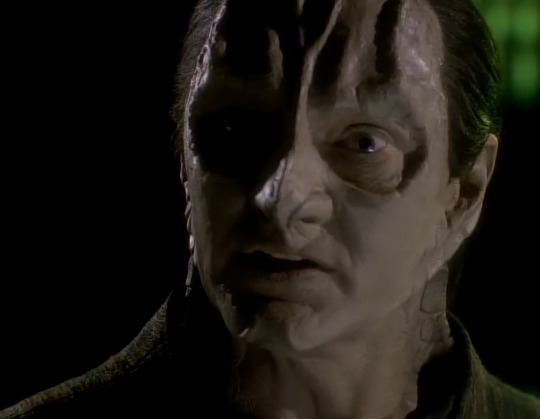
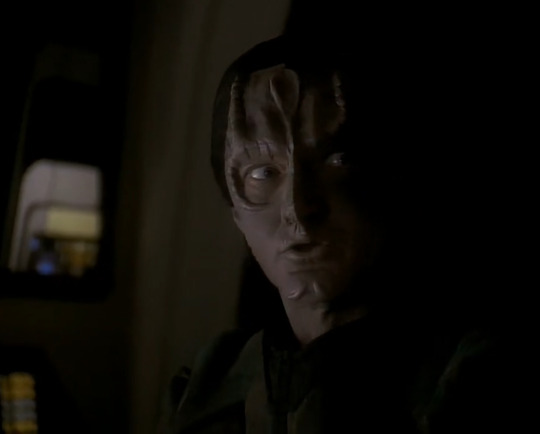
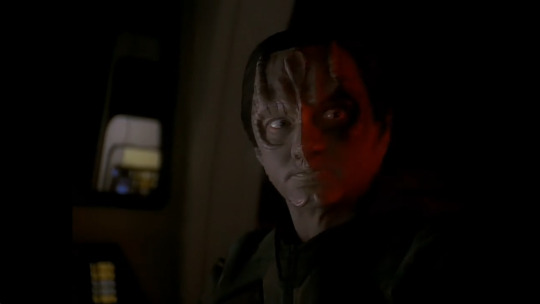
are you telling me... that this man is caught between light and dark in this moment and hasn't yet decided which side his soul is going to come down on in the end. hm. interesting. (especially cool that when the shadows of his face are lit up in the runabout at the end, that's when you see the damage underneath. he's partially made that choice and he's illuminated, but not by a comforting light yet, those are danger colours. odo and garak bonding on a day trip to hell; the episode)

I think this shot is ultimately my touchpoint for the visual language set up in this episode -- julian bashir standing there in 'wherever you have to go, come home to this afterwards' light as garak walks into the shadows (and towards tain). where does the light in his life come from currently? we may have a clue before us folks

(This one is literally just because his expression here makes my chest feel weird and aching. oof. I feel like this is one of the rare times he lets himself be really openly soft because he must know there's a decent chance he's not coming back)

aaaand what's the very first thing that greets him once he 'returns to the light' so to speak? :) little bit of a moral and emotional horror show in the middle there admittedly but thanks to odo he did come home and no one like. died or anything. well. many many people died but that honestly wasn't his fault or responsibility. we'll call it a victory

some really cool odo shots too in this ep. I love you constable this was so fucking extra for no reason
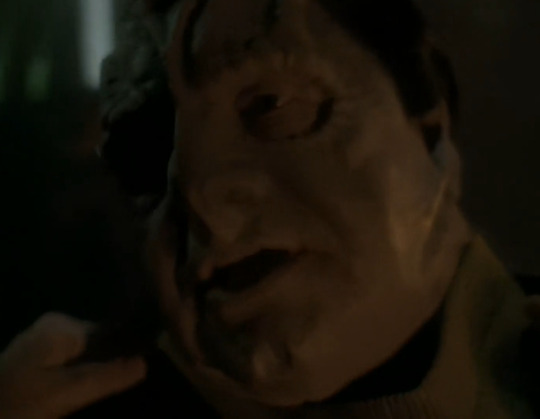

fun little detail: when the defiant starts shaking upon taking fire, Julian immediately puts his hand on Garak's shoulder -- the same way and on the same side as Garak did to Tain minutes before, when Odo had to fucking. knock him out to make him let go. (again: odo I love you. a direct and decisive thinker above all)
#garashir#star trek#star trek ds9#elim garak#ds9#odo#enabran tain#julian bashir#ds9 meta#I suspect this two parter is one of those parts of the show I'm going to go back to again and again and find new stuff in haha#so much good shit in there!!!#this is a mess b/c it's getting real late and I'm wild with new depths of emotion (and hatred for tain)#but take my humble offerings. the shoulder detail especially got me so good to realize lmao#mirrors!
400 notes
·
View notes
Text
Arcane does a fun thing with its narrative Darkest Hour.
Or: yet another post about how insanely smart this show is and how absolutely genius its writers are (and how jealous of them I am).
For the uninitiated, the Darkest Hour is the moment just before the climax in which the heroes are at their lowest point. When the Avengers are scattered and Loki opens the portal in NYC, when the Falcon has escaped the Death Star but lost Obi-Wan, when the Fire Nation is set to annihilate the Earth Kingdom, when Frodo fails to destroy the Ring at the Crack of Doom. The heroes must confront their flaws and change for the better for a happy ending.
Arcane’s darkest hour is, of course, in Act 3. One might place it at the very end of episode 9, and that’s certainly where the story is at its most hopeless. But I’d contend it starts as early as the end of episode 8 and carries on through the entirety of episode 9.
After all, that’s when Caitlyn and Vi have separated, lost all hope, and Cait is kidnapped by Jinx. Jinx’s mind is fully gone and throughout the episode everything falls apart around her. Silco is losing control of his chembarons and may well have lost his daughter, the thing most precious to him, and is only barely keeping his powerful façade in line. Zaun has realized how ridiculously outmatched they are in a war with Piltover and the revolutionary cause has become almost impossible. Viktor has manslaughtered his assistant and may never be cured. Jayce has manslaughtered a child and finally realizes how quickly he’s losing his morals. Mel and her mother are fully separating and she is struggling with her warlike destiny. Sevika gets the absolute snot beat out of her and limps to an empty office without a boss.
So yeah. Lot of personal Darkest Hours going on.
“But what’s the interesting thing?” I hear you ask in my ear. I don’t know why I hear you. Shut up. I’m writing. Are you even real?
Excuse me.
Arcane’s interesting twist on the Darkest Hour lies in part of the trope that I didn’t mention. That’s in the villain.
Most stories with a clear-cut villain have a plot structure something like this:
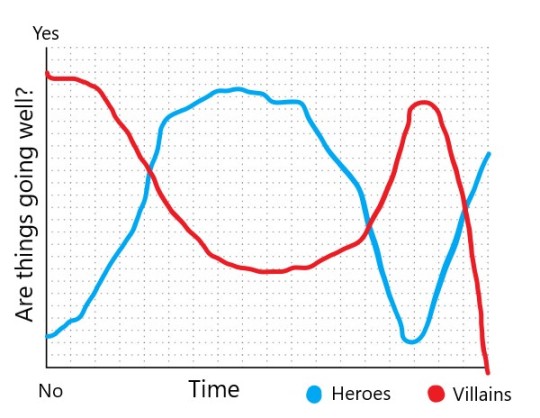
Whether things are going well for one side is inversely proportional to the other. During the Darkest Hour, when the hero is at their weakest, the villain is at their most dominant.
Wait… isn’t Silco the villain of Arcane? Not to be too blunt, but he’s having a shit time. Things are falling apart for him just as badly as for everyone else.
That's the trick. Caitlyn and Vi are suffering. Jinx is suffering. Silco is suffering. Jayce is suffering. Viktor is suffering. Zaun as a whole is suffering. There is only one party in the whole story that isn't suffering, that actually is benefitting from this horrid state of affairs...
EKKO AND HEIMERDINGER
Kidding. They're not really a part of this dance. A big part of Arcane's theming is that acting to help people without an agenda is simply more virtuous than fighting for any invariably-flawed nation that innately perpetuates the cycle of violence.
No, the side that is doing fine is the other that is conspicuously absent from my two prior lists. While the characters that make up its leadership are experiencing personal Darkest Hours, the organization itself is essentially on top of the world, having just scored a huge victory and getting set to bring the war to an end before it even begins. I mentioned how poor the situation for the Undercity looks, but not its counterpart.
Piltover.
Wasn't it so that Piltover started this whole mess? Didn't their oppression cause the revolt that orphaned Vi and Powder's parents? Isn't it their actions that drive Silco to ever greater extremes? Isn't it their normalized political backstabbing that causes Jayce to sacrifice his principles because that's the only way to get ahead? Isn't it their corrupt police force that lets Silco operate his drug empire with impunity?
Silco might look the part. He might be the most personally evil character, might be the one who causes the most misery for our main protagonists Vi and Powder.
But structurally, the shining city of Piltover, its political machine, and its Enforcers are the actual villains of Arcane.
#arcane#darkest hour#writing#silco#piltover#zaun#piltover and zaun#heroes and villains#good writing#just realized this#still noticing new things#even two full years later#i love this show#has someone said this before?#long post
216 notes
·
View notes
Text
i realized the other day that i haven’t really talked all that much about the last handful of episodes of season 5 and haven’t really touched on the ending of chloe’s story at all. and i really only see people who are upset about it talk about her last few scenes so i do want to offer an alternative take on it, which is basically: to me, chloe’s story ended in tragedy. i don’t really care what astruc has said on twitter or what was leaked in bibles or scripts. i’m looking at the story we actually got, the one that ended with this moment.

does marinette tell her off right before this? yes. and this should be a moment of victory for marinette, right? she’s finally free from chloe, in every way.
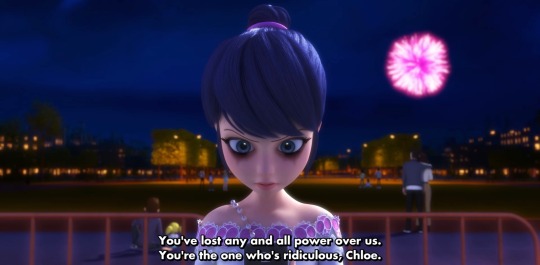
but we don’t see marinette after this. this is the last shot of marinette in the episode before it cuts to chloe’s reaction. marinette’s face is still there, but only as the contact image on chloe’s phone. marinette herself is gone. the rest of the episode only shows us chloe and lila. from here on out, we are not in marinette’s story. we’re in theirs.

and it’s here, when we move out of marinette’s story, that we see chloe’s is tragedy. chloe is the villain in marinette’s story and the victim in her own. this is not just about protagonist centered morality, though that plays a role. it’s about not just whose side the story takes but also what marinette is allowed to know and see. marinette only ever gets the smallest glimpse of chloe’s home life and family, but as the viewers we get to see more. and it is after marinette dismisses her and hangs up in revolution that chloe stops being a part of marinette’s story, and, in that moment, loses the role of the villain. freed from marinette’s story, we see her alone, sobbing, because she’s left with only her own story, where she is the victim.
and it’s notable that chloe tried to reject that story. she chooses marinette’s story, again and again. that’s why she called marinette in the end. chloe would rather play the villain. calling sabrina, asking for comfort, would be accepting that she’s a victim, which chloe isn’t ready for. unfortunately, marinette doesn’t give her a choice: marinette’s story doesn’t have room for chloe anymore. she’s fought her demons and has new ones to face. the only role left for chloe to play in marinette’s story is the girl ladybug couldn’t save.
so yeah, this ending is tragic. and i genuinely hurt for chloe in that moment. but i never once thought we were supposed to see her as unredeemable or celebrate her being sent off to her mother. i don’t know what the story plans to do with chloe next - whether she’s gone for good or she’ll come back worse or come back better. but i know this moment, by taking us out of marinette’s perspective, asked us to sympathize with a girl suffering at the end of her downward spiral.
#miraculous ladybug#chloe bourgeois#im always nervous to post anything about her because some chloe stans are so aggressive on my posts#which maybe is why i haven’t seen anyone else posting much about this either?#anyways if you with me that’s fine just don’t be a dick about it or pour salt in the replies#thanks ✌️#using my noodle
468 notes
·
View notes
Text
Only Friends: They Can't Sit With Me
I’ve been trying to find the words to express my consternation about Only Friends properly for weeks. Now that we’ve finished the show, I think I can say it plainly: The show just isn’t that deep, and the characters are unintentionally some of the worst gays you know. They can't sit with me and mine.
In so many ways this show avoided saying much for most of its runtime by just presenting the characters and putting them in situations. This would generally have been fine until the final episodes where the push to marry off the characters within their actor pairs coupled with the decision to punish Boston exclusively for any of the wrongs he had committed this season.
I hate feeling like I must defend Boston, because he was not a good friend to his squad. He introduced Top to their group just to fuck with Ray of all people for some reason. Then he got jealous when Top took a shine to Mew. He fired Ray at Top and Mew, and misrepresented a video he took of them to get Top to hook up with him one more time. (As a note, I also hold responsible for his decision to fuck around with Boston and withhold that information from Mew as well, but we’ll get there.) However, Boston is one of the only people in this show not using sex as leverage over the person he’s with or hounding people about putting out.
I hate that this show kept comparing other characters to Boston when Ray is fucking around with Sand while he’s seeing Mew. Top and Mew are playing their little stupid games about sex the whole time. Nick is pretending to be okay about stuff that he isn’t and using a sex tape as blackmail. Boston becomes the victim of blackmail and revenge porn in this show! Why is he the one who deserves to be punished for anything wrong that he did exclusively while everyone else is in “happy friend land” at the end of this show?
Also, what the fuck was the point of Boeing? They introduced Boeing as like a final boss but he revealed NOTHING about any of the characters, especially Top! Force did such a thankless and difficult job in this show only to get stuck in an enigmatic character that we can never get a secure read for. Boeing showed up and seemed like he was more of all of them, and we learned nothing because of his intrusion, and he gets rejected in the most perfunctory way possible as the final source of drama. Disappointing.
As I reflect on this show, I wish it had been episodic instead of a serial. The problem Only Friends has is that in the end it becomes a single story that took 12 weeks to tell. All this drama was so aggravating because these homos DO NOT have each other’s backs. Mew helps Boston out of a sticky situation just so he can be morally superior to Boston. Top helps Ray out of a situation and many of us thought that Top could have been the one who called the cops on the party! Cheum decides to castigate Ray AS HE’S BEING ARRESTED FOR DRUG POSSESSION. Cheum accuses Boston of assaulting her brother under false pretenses, never offers him a real apology, and then thinks that Boston should abase himself before the group at the end. If this show had been episodic, each episode could have been about a gay issue within this group and resolved itself within the episode while continuing larger arcs.
I feel like the angst between Boston and Mew went to waste. Why are they jealous of each other? Why didn’t they hate fuck? Mew is a virgin and Top was his first time. Why did we not unpack how Mew views himself after having sex for the first time? He had been holding out for so long and we never spend time with him really understanding how sex impacted him. Why wouldn’t he touch Ray at that point? Sure, he was never into Ray that way, but what is the core of his sexual preciousness?
This show spent the entire final episode taking a victory lap around Boston losing everything and celebrating these dysfunctional ass couples getting together, only to end on a scene of Mew being interested in Mix’s character as Top looks on worried. What a terrible place to end. We never understood Mew’s thing about sex and especially Top. We never understood Top. After dunking on Boston one final time, we end on Mew wanting to flirt with someone else? Terrible.
These people are still young, but this is not what community looks like. These characters are mean to each other in a way that makes me really worry about the shit that this queer team had suffered as they came of age and entered the scene. I believe in queer community. I believe in helping the people in our spaces even if I don’t like them personally. Even at their worst in Queer as Folk, those guys and gals had each other’s backs. Where was that energy here?
They are truly terrible friends. In so many ways, I was grossed out about the way a bunch of homos turned on the slut in their group only to end the show on a game of spin the fucking bottle where they made Sand make out with Top. It feels so weird that a group of queer people essentially ostracized one of their own for failure to conform with monogamous norms. NOT A SLAY.
Beyond that, I feel like most of the cast didn’t even get to play against type! Khaotung playing drunk so consistently was impressive, but he’s always been a pretty, rich, shit stirrer in most of his roles. First is always a grumpy simp. Book is always the virgin. Force got to be a jerk in a really fun way, but we never understood the interiority of his character. Mark and Neo got to do different stuff, and I really hope Neo gets an award for the way he fully embodied Boston.
I had a lot of hope for this show, but in the end, it will just be remembered as an amusing romp that fell flat in the back half for me. With that, I am done with Only Friends, and hoping to be done with GMMTV in a while, honestly. Between this, Hidden Agenda, Dangerous Romance, and a Boss and a Babe, I’m quite over it.
We wrote so much about this show trying to mine depth from it and the well was too shallow. It’s alright for us to admit that this show wasn’t that deep. We can admit that it was just a lot of fun for a few months. “This show is fun” (read: easy to fap to) and “This show is good” can form a Venn diagram, but that is not a circle. You gotta know when to fold ‘em.
174 notes
·
View notes
Text
Hunter's Experiences After Belos's Death
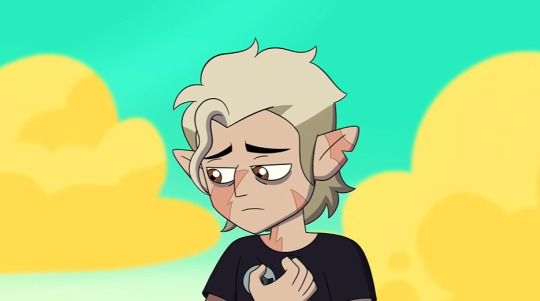
Oops, this got long. Aw well, it was really fun to write.
Special thanks to @ashanimus!
This is speculative at the end of the day, but since:
1. This is my fave animated show of all time
2. I grew up with Complex PTSD (CPTSD) like Hunter
3. I work as a therapist,
I thought to list down some things I can visualize happening in the duration of the finale's timeskip, before that beautiful epilogue we saw. And I want to dive in using whatever clues, leads and parallels I can find in canon: to analyze and see how he went from the Bad But Sad Boy to that peaceful-looking palisman carver in the epilogue.
A small reference I had for this meta is Cinema Therapy's episode on the Hunger Games movies (link), since the protagonist, Katniss Everdeen, from the book and also movie trilogy would have the same diagnosis as Hunter. Those books and movies explored how Katniss coped with the frightening and dramatically different landscape that was the calmness of her world post-victory.
Part 1: His Possible Experiences Leading Up to Seeking a Therapist
His disposition could possibly become like Luz's from early Season 3: a state of emotionally shutting down and numbing out. He appeared to nearly head in this direction right after he was revived by Flapjack, as he began to cry. There was that small window where he could have expressed more tears than he did, and have his body shut down under the weight of bereavement.
But the immediate physical threat, Belos, was still on the run. He got up, sprang into action and didn't catch a break from the time he followed Belos through the portal until he stood in The Collector's palace after Belos died (had he even received the news of his 'Uncle' dying yet??!).
Now that Belos isn't around anymore, the Isles will have a completely different feel and rebuilding the land would've taken grueling work after the dismantling of a damaging Coven System.
I was looking at Luz's behavior and gestures in Thanks to Them, which were indicative of her sinking into depression after 1. the horrible revelation in Hollow Mind that she unintentionally helped Philip. 2. witnessing Flapjack's death. I'm putting screenshots of her below in parallel with Hunter's own emotions in For the Future:
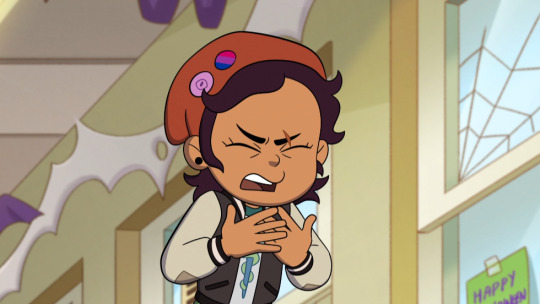

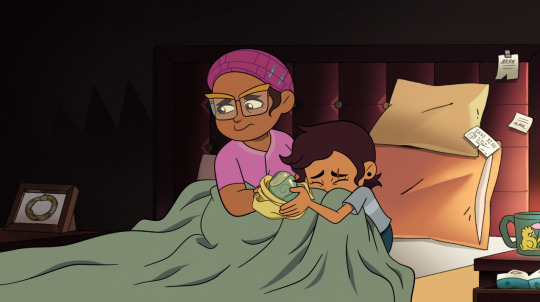

They have different mental health conditions if you talk symptoms, e.g. Luz doesn't show signs of CPTSD hypervigilance, while Hunter doesn't have that slowing down in his physical and mental activity which points to depression. But both have suffered from moral injury thanks to Belos's violence and manipulation.
However, a major comparison is that Hunter has had much more repressed emotion over a long period compared to Luz. The column with Hunter screencaps above, is what he may feel with a much higher intensity in the weeks and months after he first hears that his abuser has passed on.
Shown below, the few seconds of Hunter's big smile drooping when it was all over, was a big hint for me:
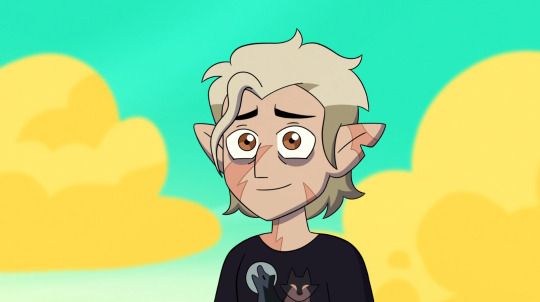
A hint that there is a deep undercurrent of emotions he'd much rather not feel, that he'd probably rather hide from himself. Even while smiling, we know how his heart-wrenching story has played out and the light in his eyes here doesn't match the brightness we see in his expressions in the epilogue, post-timeskip.
That is the face of a kid who has not cried out massive amounts of tears yet. He doesn't look like he's carrying a light load yet, compared to what we see in his future self. And it's certainly a heavier smile than the jollier one he makes here right after King's Tide when Flapjack was still around:
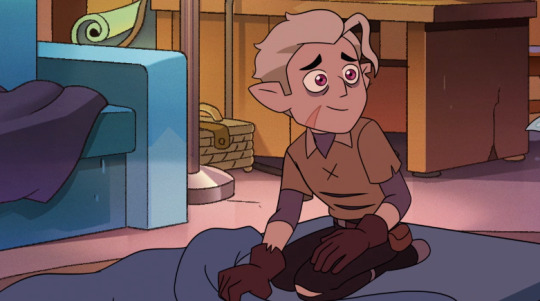
I can't imagine the amount of grief that his body has yet to dredge up and release, once he finally doesn't have to worry about his 'uncle' threatening his life anymore. Too many times to count, I've been in the situation where I cry intensely after being retraumatized and think "Huh? More tears? Where did it come from?? I thought I had cried it all out from my whole being the last time!". It kind of convinced me that anyone with CPTSD has so much grief stored up in their body that the number of times needed to have a good cry feels like a really endless expanse.
However: because I had 7 years of being in and out of therapy, what matters is that the durations between these episodes of mine, the durations of the episodes themselves, plus their intensity have reduced a lot. It was around a 4-year timeskip in the finale, so for Hunter to get as far as he did to heal, his own therapy sessions would've probably been rigorous and very consistent.
Anyway, he might now cycle through his own version of what Luz cycled through when she gradually shuts down from failing to build a new portal door in Thanks to Them, continually believes she's as bad as Belos, and when she alludes to her suicidal ideation in the classroom:
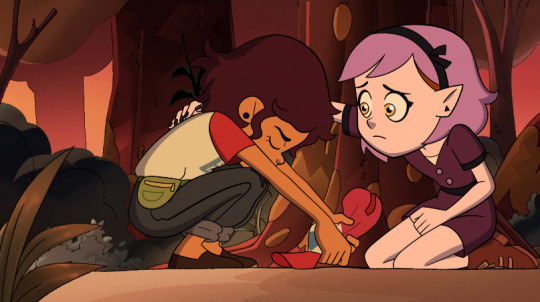
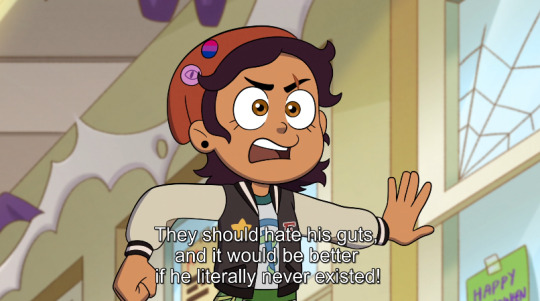
whereby there is a likely parallel between Luz wrestling with guilt from her own moral injury, and Hunter's own guilt from what he wished he could've done to prevent being possessed, to prevent Flapjack from dying. Both their situations are that of moral injuries.
The adrenaline rush would be over for everyone on the Isles.
I'm quite sure the therapists on the Isles will operate pretty soon after the news about Belos's death was out. They would conduct whatever version of mental health triage they have, that involves risk assessments and crisis counselling. Both of these based on what I've learnt are shorter in duration (30 minutes) and are one-off sessions, compared to regular talk therapy which is an hour minimum.
The therapists would be redirecting people to necessary resources e.g. where to find food or loved ones, and managing distress only related to people's immediate needs instead of forming a longer term plan for several weekly sessions.
I believe things are simpler when you are running away from an external threat, like the two Hunter scenarios below. In Hollow Mind there is no emotion on his face because in peak C-PTSD mode he has shut down his emotions to pour that energy into escaping Belos. In Thanks to Them, he appears quite obviously scared with widened eyes because he got comfortable with safety for months and Belos's return was a surprise attack (thanks ashanimus for pointing out to me how his expressions are animated!):
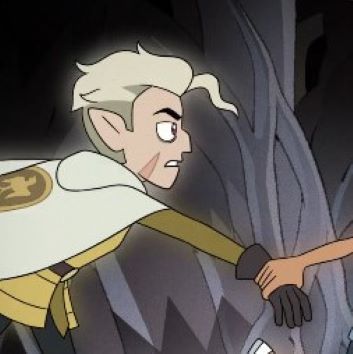

But what is there to run from now? Not an external threat for sure. The war zone is now the one in his mind, heart and soul and it would become front and center. I believe both these screenshots are two notches on a dial, and the missing third image - which would show him finding it difficult to stuff down the grief any longer, might look like a more exasperated version of when he told Willow "Please don't call yourself [a Half-a-Witch] ever again" in For the Future, and eventually a more depressed version of his vanishing smile in The Collector's Palace.
When can he really run from himself? Only while asleep, if he's spared nightmares on any given night, or while distracting himself with the main mission of rebuilding the Isles or continuing to bond with his friends and other people.
His anger in For the Future was a telling sign for me that he made sure his focus was still on an external threat: he still had the opportunity to do so back then, because Belos was still alive. But when we see him in The Collector's palace sending Willow off to her dads, there has realistically been a shift in what will threaten the more fragile shreds of inner peace he's still clinging on to. There are those scary trauma-related emotions to worry about, which wouldn't have just evaporated into thin air. They would be looking for a new outlet, and they'll find their way into flashbacks, nightmares, tension still stored in the body, an exaggerated startle response, etc.
We have seen a range of reactions he has to danger, triggers and emotional pain: some involve moving his body more, and fewer involve a short of shutting down:
Flinching during Belos's tantrums, being able to fight Kikimora calmly, freezing up in the throne room (Hunting Palismen)
Suicidal ideation and even a sort of suicide plan (Eclipse Lake)
Freezing up and expecting punishment from Darius (Any Sport in a Storm)
Being able to stay almost entirely calm as he learnt more and more of the truth about Belos, though his hand was shaking briefly, then a panic attack later on (Hollow Mind)
Lots of avoidance symptoms like numbing, combined with hypervigilance e.g. shivering and another panic attack (Labyrinth Runners)
Feeling fear with underlying shame and subconsciously expecting punishment, when he failed to save Luz (Clouds on the Horizon)
Freezing and recoiling, though he fought against this by asserting a boundary with Belos (King's Tide)
Panic attack when looking into the mirror and having an emotional flashback, hypervigilance e.g. stamping his foot and shivering (Thanks to Them)
Anger and rage to cope with bereavement, later being tearful (For the Future)
Most likely a sense of bereavement, deep exhaustion and possibly loneliness, during that briefly shown moment in The Collector's Palace (Watching and Dreaming)
The serious work he has to put in to heal from his trauma would begin once his whole body gives in to the exhaustion, catching up with the bereavement-related emotions that have also begun to settle in. It could be a massive emotional and physical collapse that he can't fight off, where his physical energy levels become tanked seemingly out of nowhere. And I think it would look like a worse version of him lying in his makeshift grave, where he is barely able to move around the house or anywhere for some time.
This happened to Katniss in the Hunger Games trilogy, and while the portrayal was done differently in the books and movies, both were good explorations of what it's like to shift from the default high alert (and long-term) mode of CPTSD to coping with the scary unknown world of newfound safety. Katniss spent her childhood in poverty and being constantly on edge that she might be chosen for the Hunger Games, being parentified, to provide for her family.
While participating in the games, she had to utilize battle skills and kill others to survive and sustained many injuries, still constantly on high alert whereby any respite would last for incredibly short durations. Towards the end of the story, after she loses the one she loved most (her sister Prim, who I think can be a parallel of Flapjack in this meta), Katniss shifts from peak physical activity into mostly sleeping and being actively suicidal for months, hardly moving and not leaving the house, until the shock of traumatic grief began to wear off. She absolutely crashed and went from one extreme to the other. In the movie Mockingjay Part 2, they added a non-book scene where her grief comes out in an outburst when she sees their pet cat hanging around on the kitchen counter. She flings an object in the cat's direction, then screams "[Prim] is gone!!" repeatedly before collapsing into heavy sobs, picking up the cat and holding it to her chest to soothe herself.
This kind of major collapse might happen very soon to Hunter after he leaves The Collector's Palace or only after some weeks. The timing of this, I can't predict. The reason why he didn't appear to have this issue in the early months being in the human realm is because there was still something external to concentrate on: help his friends get back to the Human Realm, help Luz reunite with Eda and King, while him and Flapjack hoped to go home too.
You could argue that even now, he still has something external to focus on i.e. helping the others rebuild the Isles. However I keep imagining that the people who love him are going to be quite adamant in getting him, Luz and the other kids to please rest. Since we saw Steve recommend his therapist to Lilith in O Titan Where Art Thou, I can picture the adults in particular monitoring how Hunter is doing without Flapjack.
But if this collapse I'm speculating about doesn't happen so soon, he would be pouring himself into helping others, referencing his character-centric line all the way back in Hunting Palismen about wanting to offer help, which he utters twice in that episode. There is an overlap between this expectation he has of himself and the old habit he's at risk of falling back into periodically: overworking.
Once his desire to help others is clearly comes across as an avoidance tactic on the outside - a maladaptive coping mechanism to run from the very difficult emotions that he should be processing - people around him are definitely going to set boundaries and say "No" to any attempts he makes to assist them. Someone is probably going to tell him that whatever desperation he is showing in wanting to help other people, needs to be redirected at himself. Making time and space for himself, taking time off to rest.
Him suffering from a major emotional and physical collapse is pretty likely because things are more complicated (though, physically much much safer) for him now than at the beginning of Thanks to Them when he had just fled from Belos to the human realm, and had Flapjack as his closest company. Fast forward to the victory won in Watching and Dreaming: both Flapjack and Belos are gone now.
It's telling that different thoughts are occupying Hunter's mind now, from how his expressions are drawn during his first days in the human realm vs. when peace is restored in the Isles.
1. See the sense of calmer urgency in his expression, putting the mission of building the portal door first, while experiencing a strong sense of togetherness with his friends, and learning to trust Camila who is treating him well:
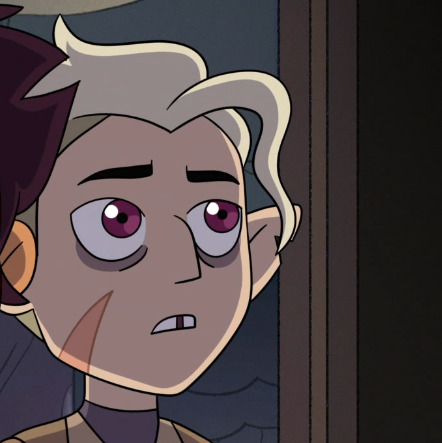
compared to
2. the sheer exhaustion and feeling of "What now...?" (see his upper eyelids below?) that set in, once he helped Willow find her parents and there was no more task at hand that didn't involve himself. His bright smile from a split-second ago has drooped and disappeared:

I know that right after the above frame, Darius and Eberwolf reunited with him, but his emotions are going to cycle up and down in the hours, weeks and months ahead. The elation from seeing Darius and Eber - people who were there to greet him when he expected nobody to turn up - is not going to last, though it will certainly come and go, because high-running positive emotions like that don't last as long, especially in the context of the life he's had as a child soldier. It's totally possible that on the same night, hours after this reunion with their loved ones, their emotions will shift drastically.
The tired look in his eyes above and the sad face he then makes, is in between two moments of him having something external to focus on (Willow and then Darius). I'm inclined to think that the above depressed look reflects a lot of the complexity that is going on underneath the surface. What is his state of mind when alone with his thoughts, when he has zero tasks to perform? How is he handling those thoughts?
There will be a deep, sometimes mind-numbing sense of bereavement over two significant figures in his life. First Flapjack, now this:

He used to love Belos. But I'm really not sure he can just uproot that love from deep within and discard it. Hunter carries memories like the following ones around which will be confusing to navigate on tougher days, despite being able to tell Luz "That's what Belos does, he tricks people". Because these were his formative years:

and something tells me that Philip was cunning enough to strike a delicate balance between being 'nice' to Hunter like above, versus unleashing his violent temper to terrify and harm him. Making sure that balance was so close to 50/50 that it would leave a child very confused. So confused he would rather believe he's never good enough rather than the more frightening prospect that his so-called family does not actually love him at all.
Hunter will have a moment now and then of still missing the 'niceness' that his 'uncle' showed towards him (felt in his heart and subconscious), while still knowing (in his head, rationally) that Philip was not genuine when treating him that way.
To note though, he did not witness Belos's death which reduces the severity of intrusive images that the poor kid would see in his mind.
What I'm worried about is how he'll handle the news about the grimwalker graveyard, since I'm sure that location is going to be scoured and Darius would want to give his mentor a proper sending off. They'd want to give all the Golden Guards and Caleb a sending off and pay their respects. This might add to what I suspect will be the messed up depression he'll fall into.
It will be very confusing and emotionally disorienting, literally not needing to worry about anyone killing him anymore. He has had no point of reference for this in his life at all. It might possibly the furthest he ever goes from that primal survival instinct he had while living in the Castle for so long, which took up the majority of his life so far:
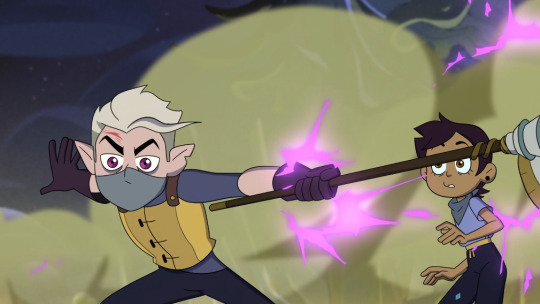
There will also be the added layer of how he feels about those first emotions. This is literally a concept called Feelings About Feelings and it's a key part of my work since I use the Satir Model in my style of counselling. We don't just feel emotions, we also tack on our own judgments and evaluations about them. E.g. shame about feeling anger, guilt about feeling sad because of burdening others, or even a combination like fear about feeling joy which can show up in healing from bereavement.
Depending on how we feel about whichever emotions got there first, it makes a difference because we could be adding or subtracting unnecessary suffering from the first emotion, especially if the first emotion is an already unpleasant one.
I have a feeling that we'd see Hunter look very very tired, till he makes breakthroughs in therapy. A tiredness that sleep, a healthy diet and exercise alone simply cannot fix. Because there's an entire upbringing in the Emperor's Coven to sort through in his head, this time not combined with the avoidance of having fled to the human realm and living under one roof with his friends.
The Hexsquad are not living under the same roof anymore, they are reunited with their own families with much to emotionally talk out, and the group no longer has a very urgent single collective mission. Sure, Hunter has an active role to play in rebuilding the Isles, but what about rebuilding his very self? He has the steepest climb, because we have seen the symptoms he exhibits.
Most of all, referencing a section of my Retraumatization and Self-Soothing (Part 1) meta (link), a memory as horrible as this:
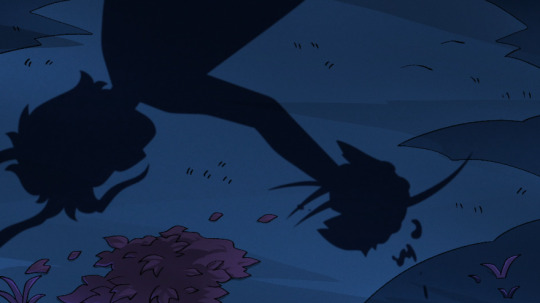
will likely be the most intrusive image is going to be replaying again and again over the months to come, and it may flood his thoughts during moments of being triggered or even out of nowhere during quiet moments for no apparent reason. It will be just like a broken record, where the same small excerpt of a song loops endlessly until the needle of the gramophone is repositioned.
It was remarkably poignant that his final words to Belos were "And most of all, I'm going to make sure you never hurt anyone again", and I'm happy with the story keeping it this way and understand why the writers likely made this decision - not just because the season was shortened. Hunter did not need to directly see or hear more from Belos in close quarters, not after his abuser minimized his needs for years, gaslit him, possessed him and got him to murder his best friend with his own hands.
It's more straightforward to make sure someone else isn't hurting anyone. It's easier to think of what plans to implement, when it comes to him protecting others: which he has had plenty of practice with. Because those are practical methods that we can see in action on the outside.
But here's the kicker: what about applying that last grand statement from his TTT speech to himself, emotionally: making sure he isn't psychologically hurting himself with harmful unhelpful thoughts and beliefs, after Belos's death? "I'll make sure I don't hurt myself (and by extension, my loved ones) again".
This will be very new to him, and it is a theme that I handle in pretty much every client case in my therapy work. The client's self-dialogue, the self-compassion or lack thereof. Which, in real life, is often not a concept that our own families and schools introduce to us to be familiar with.
For Hunter, this may translate into him making the decision to get help and truly accepting the gift of life that Flapjack gave him.
Basically this on a much bigger scale:

whereby in Flapjack's absence, he can truly believe in this new and positive fundamental belief about himself. The evidence that he managed to make it to that heartbreaking but incredibly beautiful place is pretty strong:

But before his happy ending, the pressure on himself to be useful to others via helping and working is likely going to come back and be used as his way of coping, and there's a chance it will cross the line into becoming a form of self-harm that he's relying on to avoid the frightening, deeper emotional pain. People around him know him well enough that they'll be able to spot his behavioral changes and then sense he is not going in a helpful direction. They'll see that it's hurting him even though it's the most familiar territory for his mind to be in, and someone is going to tell him to change that.
He's going to be seeing his friends with their palismen. How will it be like being among them, even if they are pretty good at supporting him? How would he attempt to make sense of the void that is the absence of the incredible love he experienced from that first friend, the absence of that mental link between witch and palisman?
What emotions could be lurking beneath the surface? Believe it or not, there are some signs from Luz's nightmare even though yes, Hunter was being controlled by The Collector. I wouldn't quickly dismiss this dark Flapjack-related scene as 100% being about The Collector's goal to scare Luz in the nightmare.
I think there was a smaller subplot going on as well.
The Collector needed material to work with in the first place, to perform the puppet acts: the material was whatever fears and whatever pain was already there in their targets.
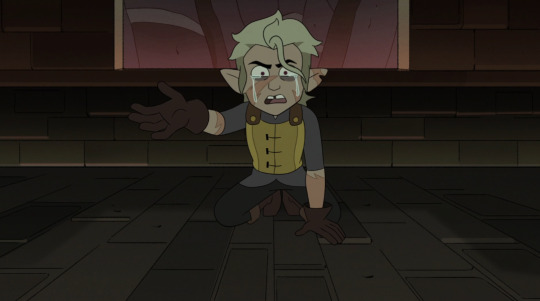
The Collector didn't create Hunter's emotions from scratch for the puppet act; instead he manipulated and redirected what existed at the base level. All this wouldn't work as analogies of mental illness vs. mental health if The Collector could just engineer emotions on their own and simply replace whatever his puppet targets were already feeling. Emotions never vanish and always take up space somewhere, they are redirected, transformed or channeled into outlets even if it means they become repressed or locked away. But they never stop existing.
I have a feeling that despite the nightmare being Luz's, despite Hunter being used as an instrument for The Collector to achieve their goals...the pre-existing emotions that Hunter himself felt in his body, not puppet!Hunter's verbal responses towards Luz, were true. He is a haunted boi.

This face he makes above might be a hint at the worst of his pain. It might be the furthest he has felt from when he said "I like who I am right now" to Flapjack. In the place of that confidence from before, there might now be his own version of Luz's "I'm as bad as Belos". I cannot be entirely certain, but the negative belief that may have taken root in him could be "I am not deserving of the life Flapjack gave me".
Interestingly, if this is the case, it could easily parallel his line from all the way back in Any Sport in A Storm: "I'm unfit to wear the sigil of the Golden Guard." It's definitely a possibility, since Hunter is now faced with having a lot of time and space now, and less urgency than he's ever had in his life, to think back on all those times he helped to further Belos's cause. Especially when it came to sending many palismen to their deaths.
With his own palisman now dead, the engraving we would eventually see on Flapjack's grave: "Thank you for finding me", would be the destination. But the journey needed to reach that destination of amazing gratitude in the first place...must have been a harrowing one. In the early months of the acute grief, it would've been more like "Why did you have to find me?! You shouldn't have. Then none of this would've happened". Not forgetting the number of times Hunter has replayed in his head what he could've done differently, trying so desperately to rewind the clock and make that better alternate timeline a reality.
If you remove The Collector and even Luz from the equation in the Luz nightmare scene, Hunter may well be having such responses - the ones that puppet!Hunter directed at Luz to blame Luz - as a dialogue with himself. He might direct those negative emotions towards himself since he's so careful about hurting others and has taken on unfair punishment for so much of his life.
Even when he was temporarily himself, smiling, expressing a positive emotion to encourage Luz with "What's the first thing you do when you wake up from a bad dream?", that was him conversing with another person, someone external. Not his own self. I am willing to bet he wasn't at a point in his arc where he would smile at himself like that and easily encourage himself in the same way.
While we can be certain he had already reached his breakthroughs by the time we saw him post-timeskip, he has not experienced them yet in the frame above. He has not felt (yet) what Luz felt onscreen when she had breakthroughs in relation to her moral injury:
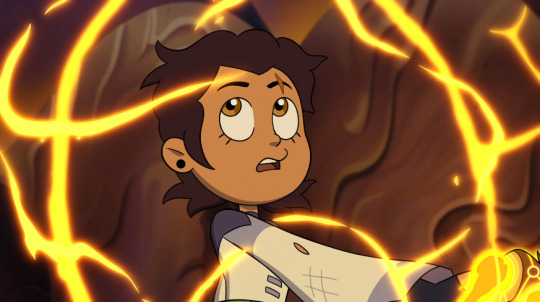
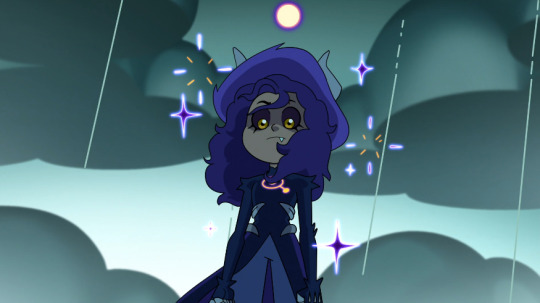
Taking a leap of faith to accept the Titan's gift, to trust that he chose her because she has a good heart and will never be Belos.
Then later, being able to stand firm, believing she truly is good ("I am the Good Witch Luz!"), and not uttering a word to Belos as he died - which was post-traumatic growth beyond how she broke down under his threats and manipulation towards the end of Hollow Mind and later in King's Tide.
Recap time. In the (quite likely) long period that passes by before we meet his new palismen, he's likely going to want to jump into action and attend meetings with Darius, Eberwolf and co, help to physically rebuild things and organize people with his own Coven Head experience. Leaning back on the ingrained and familiar lifestyle of pouring himself into work and gearing towards burnout is certainly a risk to watch out for.
The Hexsquad, CATTs and the Clawthorne sisters are going to notice his behavior and likely urge him to get appropriate rest and seek help.
However, there is the other extreme: Belos isn't around anymore to torment him, and Hunter would know this in the rational sense (head knowledge). Which leads to the possibility that he may swing towards shutting down as opposed to overworking tendencies. He would feel allowed to do whatever he wants, in this new Boiling Isles, and he had months of opportunities to do that in the early part of Thanks to Them before Belos's return.
What I'm getting at is, if he didn't sleep enough before, he might swing towards sleeping too much after finally collapsing from the familiarity of survival mode into unknown but genuinely safe territory. If he cared too much about helping others before, he might swing towards a depressive state of apathy (the closest canon reference point would be him digging his grave: he was very disarmed in that scene to even think much about helping anyone including Belos). This is why the screenshot I used of his smile drooping in The Collector's Palace, feels like a big clue to me. This would be where Darius, Camila and other adults have to seriously keep watch over him.
In the Cinema Therapy episode I had as a small reference for this post, the licensed therapist who hosts the series mentions that "It takes a lot longer to put oneself back together than it took to fall apart." In Hunter's case, the "falling apart" period here refers to that collapsing I mentioned. It would be the time between:
1. the grief hitting him in full force: when he subconsciously understands and acknowledges that Flapjack isn't coming back (which...will involve hell of a lot of wailing and sobbing. Him having a full version cry of those first few tears he shed at the end of TTT),
and
2. the time when the painful shock from feeling the full force of the grief has decreased enough that it plateaus.
This falling apart stage may need to pass before he seeks therapy. If he tries going for sessions while still going through that shock and pain, it might be too much for him.
As terrible and sad as it sounds, a deep dark spiral like this might be necessary. It would be his body and mind wanting to compensate for several years' worth of unnatural hypervigilance which wasn't serving him in a advantageous way (i.e. surviving) any longer. His body and mind begging for rest at last, to try and make sense of everything that happened. This big collapse into depression would empty out the old and free up much room in him for new stories, beliefs and perspectives to take root. Depression is, after all, the body's attempt to (maladaptively) try and protect us by numbing us, or else we would be overwhelmed.
As someone whom we know keeps himself very busy, this could be the period where he is the furthest he has ever been from that old simpler life. Because his CPTSD-ridden body would be demanding more than ever that he compensates for a childhood and teen years' lack of general rest, he may not even have the strength to cope the way he did before. The only way he might possibly cope in this period is to go with the flow of that raging current and do exactly what his body is asking of him: getting real rest.
Like what happened with Katniss in the Hunger Games trilogy, this early grieving stage would emotionally be difficult and terrifying, like walking along a tightrope, finding balance between left and right to angle yourself as straightly as possible and walk forward. (the tightrope metaphor is what I use with some of my clients to explain swinging between extremes of coping mechanisms).
The missing pieces of the puzzle in his arc, in the 4-year duration before the timeskip, might be his own version of these points in Luz's arc:
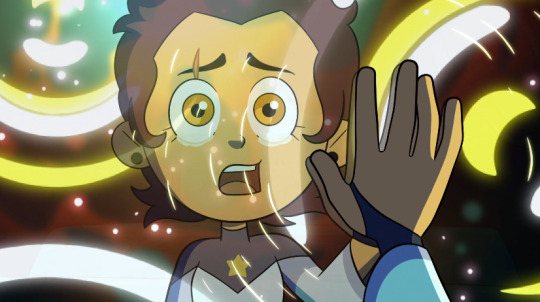
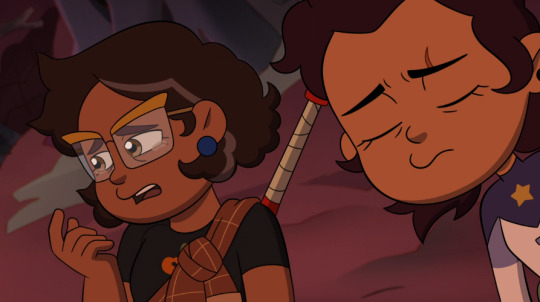
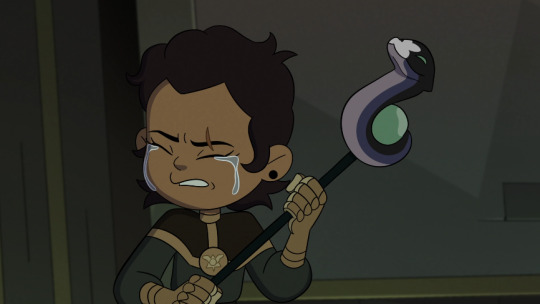
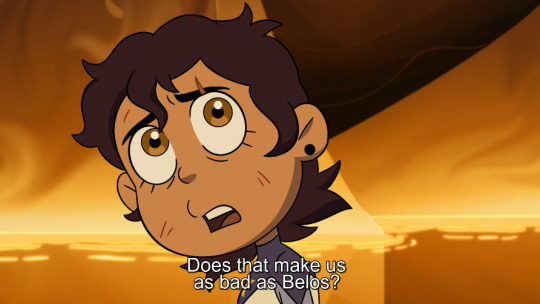
where she sank lower before she realized her deepest wish and emotionally experienced her worst fear in her Watching and Dreaming nightmare.
For Hunter, these could look like the following:
Like Luz saying it'd be better for everyone that she permanently stays in the human realm, Hunter might say he wants to remove himself from his loved ones in some way, for good. Whether a literal suicide attempt (like Katniss from The Hunger Games) or not, I can't say for sure.
A parental figure trying to reach out to him, saying he is deserving of Flapjack's gift. But he still struggles to believe that. What matters though is this parental figure is present and he's not pushing them away.
Him hearing some confirmation of his deepest negative belief about himself, in his own nightmares. Like Luz hearing the most terrifying things she could ever hear - Amity's "You've been the real villain this whole time" and "But for the sake of everyone you hurt, I challenge you to a witch's [duel]".
Him being able to reach an emotional space where he can begin to question that unhelpful belief: "Am I really deserving of Flapjack's gift?", or something similar.
The big moment when he finally tells someone how he really feels about the possession, Belos's death, Flapjack's absence in this new supposed peace and quiet....this would be the important invitation for the other person to connect and meet his emotional needs, and is a lot like how support groups for addiction work: a client needs to acknowledge that they are struggling with a problem, not avoiding it with distractions any longer, and then seek help and express their need for said help.
I suppose the question is how soon Hunter might decide to accept professional help and give it a go: or whether he'd have the genuine need for space first and say "I need some time". Because one's rational mind can be ready to go for therapy, but their subconscious and body would find it too unpleasant if it's too soon. Every part of him would have to be ready to begin putting himself back together after the falling apart stage occurs.
The messed up experience of CPTSD is that you stay shockingly calm during real danger, but on the flip side have big, disproportionate freakouts during actually safe times. Compare how calm Hunter was when he smiled at Luz in her nightmare while he was tied up with puppet strings vs. his fear and shame when he couldn't save Luz in Clouds on the Horizon.
In a CPTSD memoir I read, the author describes that it was horribly frightening to hear her partner be in a bad mood and wash the dishes more loudly than usual, while during the pandemic, she felt completely calm seeing empty shelves in a supermarket when she struggled to get supplies.
From my own experience, I have experienced being pretty damn calm when bleeding out and needing hospitalization. But in a different year before that, I recall one afternoon alone in my house right before a vacation where a strong gust of wind very loudly slammed an open door shut next to where I happened to be standing, and I broke down sobbing from a retraumatization via an emotional flashback. Because it felt extremely real as if my abusive parent was lashing out to physically hurt me.
After a 5-year period of mostly being in talk therapy, and then a 2-year period of regularly scheduled EMDR therapy, my response if I have a door loudly slam shut near me now would maybe be a smaller-scale flinch and a flash of anger that would last about maybe a minute. Which is miles better than sobbing for half an hour and being dissociated and frozen in a memory for hours before I thaw out of that flashback.
Since the show's writing is just that good, I could look at Luz's depressive symptoms manifesting in Thanks to Them and see a likely parallel in Hunter's story moving forward, since we know how much this show also digs neat and tidy parallels. These are characters written for TV after all, so they'd have to fit a formula to an extent, to have compelling arcs and reach high and low points along said arcs.
Part 2: Therapy Itself
Part 1 was the setup to give a good amount of context: now for the technicalities of the therapy sessions themselves:
Like Adrian Graye said in Labyrinth Runners, Illusion Magic can sort through memories. We have seen from Gus's own powerful Illusion abilities that he could do so with Belos. It makes sense that a therapist does this in sessions to have a magnified version of how in our world, therapists exercise empathy by imagining what it is like to be their clients:

I would monitor whether his mood (what he is feeling within) and affect (how the emotions appear on the outside e.g. tone of voice, face expressions) are congruent. Congruence usually means a client is in less distress. Incongruence might mean they are in so much pain that they can't connect directly with the main emotion: the perfect example of this being Hunter laughing when digging his grave.
We therapists take note of aspects such as affect, mood, the client's motor activity, any indicators of psychosis, even down to things like how untidy their hair looks in case we get clues about the severity of their issues (this is called a Mental Status Exam, and we write what we see in our case notes per session).
Because CPTSD is so relationship-centric, I'd discuss how he's getting along with new parental figures (the Belos replacements who will heal him so much and change his life forever!) and friends.
If the Boiling Isles therapists use their own equivalent of EMDR therapy, which is theorized to be like a waking version of how REM sleep and REM-related dreams help our brains to sort through memories, it sounds like a great fit for his case. This intervention involves subconscious work and could help him reshape how he experiences memories of Flapjack and Belos. EMDR clients are expected to see vivid images popping up without control in their mind during the sessions, and they are quite symbolic e.g. seeing a grey sky often indicates grief, seeing lighter colors indicates more calm. This technique helps a client's subconscious rewrite their story the way they'd like it to be, and install new positive beliefs and emotions over time.
My own example of EMDR experiences from the second half of 2019 as a client, is it majorly changed how I related to my own abuser, got me to finally feel allowed to emotionally break away from her, even though she is still alive and even lives in the same building.
In the early sessions, I saw an image of my 5-year-old self being forced to wear an ugly grey apron that my abuser used for baking. The apron is a real object, not fictional, and the emotions I felt showing up were matching with the image: feeling very uncomfortable seeing a visual representation of my abuser's hold over me.
But in a later session after a few months, guided by my therapist, I saw a vivid image of my abuser receiving a sea burial. She was lying peacefully on the water surface and sank down until she was gone. That was me subconsciously burying any expectation that she could ever provide what I needed. This was so powerful that I could go home after that session and permanently (so far) be significantly calmer around my abuser.
Therefore if Hunter goes through something like this, he'd potentially be able to put Belos to rest and have it feel very real and true: and have significantly reduced distress about Belos-related memories. There is the potential for powerful breakthroughs for him here, especially also related to Flapjack's death and how challenging it might be to carve palismen in the beginning. Especially since in the worst case scenario, even touching palistrom wood might be enough to badly trigger him. I cover this particular point a bit more in my other meta, Retraumatization and Self-Soothing (Part 1).
We would also be discussing what he's implementing into his routine and what may benefit him. I would be seeing if he is able to laugh about things, be motivated enough to be outdoors and among people, experience pleasure when creating new things, and form closer bonds with parental figures (what I just listed is to do with neurotransmitters in the brain that increase mental health: serotonin, endorphins, dopamine and oxytocin).
If I were his therapist I might suggest that whatever volunteering tasks he does, he carries those out with his friends, and time should be allocated to managing and taking care of a specific demographic: children. Because I think it'd be a safe, low stakes form of unfamiliarity for him to have enough emotional distance from his traumatic memories. Early months of acute grief usually require such emotional distance.
Having a good dose of an environment like that alongside the other tasks where he's working alongside Darius etc, could help him because kids' emotions are less complex, and their infectious laughter and fun-loving nature may play a role in helping him be more open with his own inner child. His therapist would be seeking to draw out that inner child in their sessions, and that little child would need to feel safe enough to emerge.
Importantly, his future palisman: it would've been interesting if he did what Luz did with Stringbean and allowed the palisman to be whoever they wanted to be...that would've been a nicely organic process. But even if he had a good idea to incorporate a Flapjack-like design but change details like the color, I'm sure he thought it through very well. I'm certain that this was a major topic of discussion at some stage of his therapy. Discussing the guilt he'd feel about replacing Flapjack vs. still taking Flapjack with him in a new way.
Coming from a strengths-based angle: paying attention to which of his individual strengths he is shows and recounts in the session. If he needs reminding, I could give him a simple worksheet listing various positive qualities and ask him to circle/colour in which ones he feels he has, which then prompts further discussion and questions. Lastly, a powerful tool called reframing e.g. if he says he's worried about being a nuisance to his friends, I'll point out how much he cares about their comfort and affirm that place of kindness.
Work on inviting self-compassion into how he sees himself. Is he able to view himself the way he views his friends? If he remembers the encouragement he gave to Luz about "turning on the light", I would ask him what that would look like in his own life, symbolically.
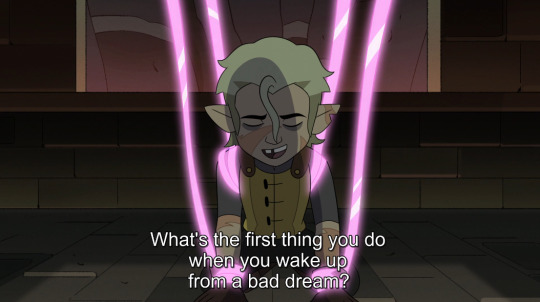
Hunter's own life has been a really really bad dream for a very long time. He himself has to reach for that light switch and choose to heal by embracing Flapjack's ultimate gift to him.
And we can rest assured that Hunter did that.
Because this post-traumatic growth right here?

This looks like multiple breakthroughs have taken place while he's been receiving consistent care from an excellent community. And there's no way it was an easily won victory. It has been very much hard-won, after how dark the story became in Hollow Mind and Thanks to Them, and it looks like whatever breakthroughs he had left him pleasantly surprised.
It doesn't seem like his heart and soul can contain this much joy and hope, without a very painful dismantling to have taken place first, to make room for the most unexpected treasures to fill his life back up.
The joy becomes even greater if you never would've expected it in your wildest dreams.
757 notes
·
View notes
Note
Do you still ship daemyra after that scene? lol it was harsher than i thought, maybe he will be better with nettles🤞
yeah lol, i clearly do since i watched it 2 years ago and i'm still clearly shipping them today. as are my friends who read this script with me in january. i would question any daemyra shipper who held on for this long, only for the written script to say something basically identical to what we see on the screen, and for that to be the straw that breaks the camel's back.
if this is what breaks daemyra for you, then i hate to say it but you have been misinterpreting that scene since the beginning.
he's choking her. it's as harsh as i expected and remembered. people who were expecting some kind of redemption via the script were deluding themselves. i said there were romantic scenes in this episode, i didn't say it was a whole new script.
i don't consider the script drafts canon, but that scene plays out pretty much how i interpreted it from watching the show: daemon being jealous and infuriated about viserys and the prophecy, rhaenyra shocked at the attack and by the fact that daemon knows nothing about it after 10 years. (i'm not going to go into a full analysis of the episode, no one would read it and honestly i've had some version of this conversation a thousand times.)
do i like the scene? no, ofc not. do i get annoyed when antis throw it in my face as a gotcha? yes. you know why? this isn't real! daemon is not a real human being, with a full pattern and history of abuse, rhaenyra is fictional, she does not exist in any world. of course, i can still ship it, just like i would ship any other problematic couple. antis act like shipping them means you support abuse, so i don't bother reasoning with them. they don't want to debate, they want to scream until they're the only voice in the room and call it a victory.
personally, i don't believe nettles is going to be on this show, since there were already rumors circulating about that as far back as 2 years ago, and the fact that they did not cast her confirms some of those rumors to me. however, it would be 100% worse with nettles. anyone shipping those two who want to point to the choke as a daemyra breaking point, well... i would say that nettles would be a teen who daemon would be both raping and grooming. so anyone who wants to seriously romanticize that and say it's morally superior to daemyra, well lol good luck with that one.
#ask#if you're just now leaving the daemyra ship i hope you find peace in a more vanilla and peaceful romance#personally i knew what i signed up for and i'll stay until the ship sinks
65 notes
·
View notes
Note
what is it that makes an episode top 10 bad for you? i ask cuz quite a few on your list don't even click my radar, they're just bland rather than infuriating (for me)
rosa -- spectacularly ill-conceived plot that contrives to have the doctor and friends sit on the rosa parks bus (!). hinges the stakes of its plot on a deeply minimizing and racist view of rosa parks and the civil rights movement
arachnids in the uk -- overwhelming reaction was 'why am i watching this'. episode that made me give up on chibnall who. all the characters potter around a hotel for forty five minutes before realizing that the problem goes away on its own and everything we've watched has been a huge waste of time
spyfall part 2 -- inexplicably makes it so that the only historical figure friends the doctor has to mindwipe are women, throwing s9 and s10's much-deserved critique of nuwho's mindwiping habit in the trash. the first master of colour is a nazi. most racist moment in the show's history. huge letdown of any potential spyfall part 1 indicated
the battle of ranskoor av kolos -- boring. bad. there's no battle and ranskoor av kolos doesnt mean anything. characters walk around with paper-thin motivations. central conflict is stupid and is resolved in a stupid way. sub-childlike understanding of its own morality
the timeless children -- i once heard this episode described as 'the master spends 45 minutes forcing the doctor to look at his powerpoint presentation' and yeah
victory of the daleks -- nothing but nauseating british jingoism and churchill worship until the new daleks get revealed with a bunch of fanfare only to spend their debut story standing perfectly still in color coded order. then amy saves the world because she's Woman and knows about Romance
the crimson horror -- doctor-lite episode about my least favourite recurring comic relief characters until the doctor shows up at which point he's a sex pest
the bells of st. john -- what if phones but too much
a good man goes to war -- like a bad version of journeys end where instead of beloved characters teaming up to save the day its a pirate wh oshowed up in one episode, a blue guy who sold river a gun or something once, and three guys we've never seen before, showing up to resolve the unbearalbe amy pregnancy plot with a stupid twist that goes nowhere and means nothing
name of the doctor -- after half an hour of Going to a Place clara steps into a hole. a lame resolution to the lamest arc in the show's history. i dont care abouyt anything that happens. at this point we're so buried in incomprehensible moffat nonsense that every other line in this episode is a reference to some ongoing arc words or another. like shut up about trenzalore i dont caaaare
115 notes
·
View notes
Text
I noticed this a looooong time ago, but I didn't mention it and sort of kept pushing it aside as an unimportant detail. After coming across this for, like, the fifth time though, something finally strikes me as supremely odd, and it's these two simple lines Leo says in the first episode of S2.
Between the S1 finale and the S2 premiere, Splinter told his sons that he defeated the Shredder when they faced off in the hideout. Not only that, he told them they'd never see the man again because he lost his honor, but both of these statements are immediately proven to be contradictory to what actually took place, as well as to what Splinter believes about the Shredder's way of thinking.
Anyone who has watched the S1 finale, specifically the second part, knows that the fight was brought to a screeching halt when Karai ran in to stop Splinter from finishing off the Shredder. And, after seeing just how deeply influenced Karai has been to hate him, Splinter left in a hurry to avoid fighting who he now knows is his thought-to-be-dead daughter.
Now, it makes sense that Splinter didn't tell the boys Karai interrupted the fight considering she was a touchy subject, one he didn't approach all of his sons with until midway through S2 in The Manhattan Project. He was still coming to terms with the revelation himself, and his avoidance of everyone's questions tells us that he genuinely didn't want to explain why Karai believed he killed her mom. In the process, he'd have to get into the reason Shredder led Karai to believe that lie and yadda yadda.
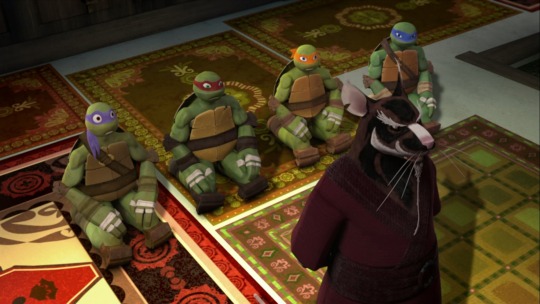
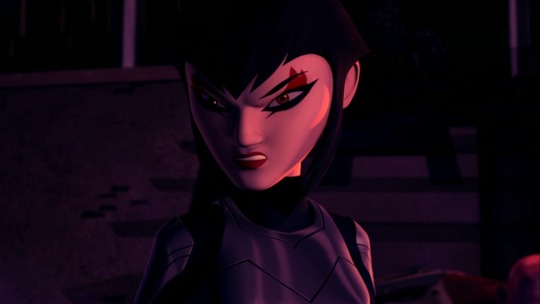
So, not telling them Karai was there makes sense. But why tell them the Shredder was defeated?
Something like that would be believable if he didn't imply any finality by telling them the Shredder was taken down, because he goes on to wonder outloud if their enemies were truly defeated and even reaffirms that, "The Shredder is a crafty and patient foe who bides his time." But Leo clearly says that Splinter told them they'd never see him again after he apparently lost whatever honor he had left. And we can't point fingers at any potential dialogue or writing error because they make sure the audience hears that Splinter did indeed facilitate this calm behavior of theirs.
One can wonder if he didn't truly intend to flat out lie, but rather to placate his sons by withholding a harsh truth and giving everyone the time they need to revel in their victory. However, that's another odd decision for Splinter to make since he's usually the one to remind his sons that none of their enemies will stay gone for long, the first and most notable instance of this being when they first encountered Bradford and Xever.
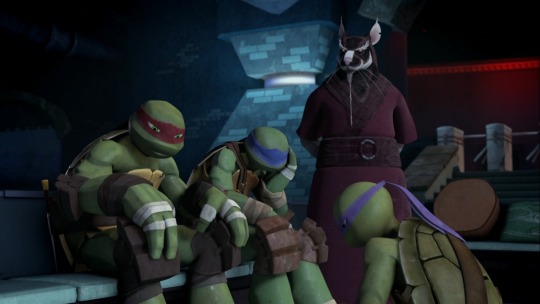
Anyways, after Leo says what he says, Splinter takes offense to Raph casually adding that they'll take care of the Shredder if he does come back, and, upon realizing that his prior statement has heavily blanketed them with a false sense of security, he harshly tells his sons the month long celebrating is over.
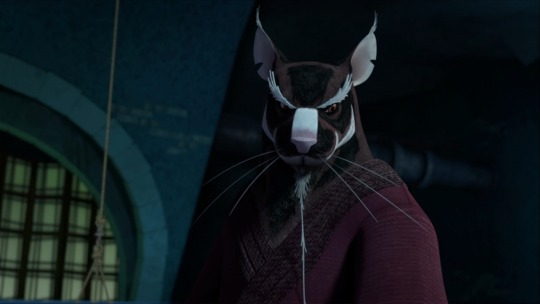
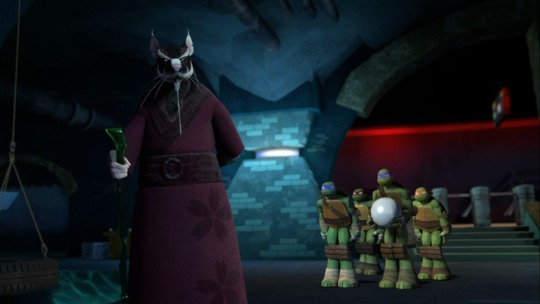
Honestly, even though I said sugar coating is very out of character for someone like Splinter, it's the only sensible answer for him lying to the guys. And probably himself for a minute there, too.
He knows the Shredder isn't honorable. He's traitorous, underhanded, and full of spite for those he feels wronged him. Oroku Saki is a vengeful man who has been undeniably wronged in his past, but refuses to learn from it and will shift the blame onto those undeserving. He's tenacious in the way he literally left Japan with a singular image of a Hamato clan shuriken as proof that he has another chance to kill someone he used to call his brother.
Splinter knows all of this, but he still went ahead and made the morally dubious decision to construct a perfect, short-lived world where he could tell his sons they wouldn't have to worry about the Shredder again.
And where he doesn't have to face the gravity of the changes yet to come.
#man leo sure takes after his father huh-#this isn't as long as i wanted it to be but this basically sums up splinter likely taking advantage of their gullibility for a bit#and yeah he definitely should not have done that but you kinda get where he's coming from y'know#analysis#sorta lol#tmnt#teenage mutant ninja turtles#tmnt 2012#tmnt 2k12#tmnt leonardo#tmnt splinter#tmnt shredder#tmnt karai#tmnt leo#2012 leo#2012 splinter#2012 shredder#2012 karai#oroku saki#hamato yoshi#karai
128 notes
·
View notes
Text
Another thing I absolutely loved about Ad Astra Per Aspera is that the victory didn't feel cheap. Una and Neera didn't win because of an impassioned speech about discrimination resulting in the court striking down an unjust law, or declaring Riley's service to be sufficiently exemplary to make an exception; they won because they found a justification within the law itself for the court to make a legal decision that was also the right thing to do morally. It gives us a victory that feels earned; not only because the victory is found within an application of an existing law, but because that law is
reflective of both Starfleet's ideals and the practical realities it faces, and
completely plausible because of it (i.e. not simply a plot device that the writers pulled out of their asses).
I also really liked how the episode utilized a certain self-awareness about the franchise, particularly the tendency of Starfleet Captains to defy orders and even ignore the Prime Directive in certain situations. It's become something of a meme within Trek, and it was great to see the show touch on it in a way that not only acknowledges it, but provides a satisfying way for justifying why so many captains are able to bend or break the rules and get away with it - because ultimately, the captain has to have the discretion to actually do the right thing.
#snw#strange new worlds#star trek#ad astra per aspera#also can we talk about that hug#i was holding it together until pike hugged una#also holy shit Yetide Badaki was phenomenal as Neera
398 notes
·
View notes
Note
What do you think about You Don't Know and other Hazbin Hotel songs?
Hi!
I love the songs in Hazbin Hotel and You Didn't Know is an absolute banger!
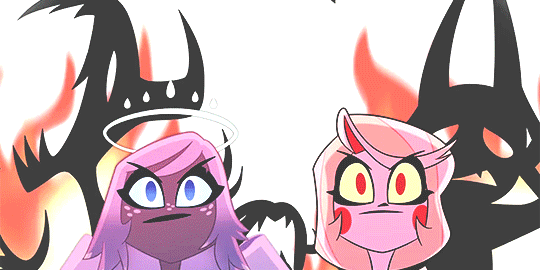
It is also one of my favourite songs when it comes to symbolism and themes. So here it comes a short analysis.
You Didn't Know explores the themes of ignorance, knowledge and questioning, as it is introduced by this exchange:
Charlie: Wait… none of you know what gets someone into Heaven?
Sera: This questioning stops now. We know when a soul arrives, we know when they pass divine judgment, it is our job to ensure these souls are safe.
The angels have no idea why a soul is considered worthy of Heaven, which angers Charlie. Still, Sera insists it is not their place to know and that they simply must accept divine judgement. However, this idea is questioned by both Emily and Charlie:
Emily: But she was right, Sera
She showed us a soul can improve
He saw the light, Sera
Checked all the boxes that you said would
Prove a person deserves a second chance
Now we turn our backs, no second glance?
Charlie: It's not fair, Sera
Vaggie: Careful, Charlie, keep a cool head
Charlie: No! Don't you care, Sera?
That just because someone is dead
It doesn't mean they can't resolve to change their ways
Turn the page
Escape infernal blaze
The two princesses point out how unfair the current system is and put some pressure on the angels. However, they too are still naive, which is why they get called out themselves.
By Sera:
Sera: It's not as simple as you think
Not everything is spelled in ink
Sera: I 'm sure you wish it could be so
But there's a lot that you don't know
And by Adam:
Adam: Gotta say, I can't wait to
Come down and exterminate you!
Emily:What are you saying?
Let me get this straight
You go down there and kill those poor souls?
Charlie: You didn't know?
Adam: Don't you act all high and mighty
Did you ever think your little girlfriend might be a liar?
Vaggie: Don't, Adam, please!
Adam: What's the fuss?
Why hide the fact that you're an angel
Just like us?
Emily and Charlie are ignorant when it comes to their loved ones. Specifically, they ignore the role of both Sera and Vaggie in the exterminations. They don't know Sera and Vaggie's shadows:
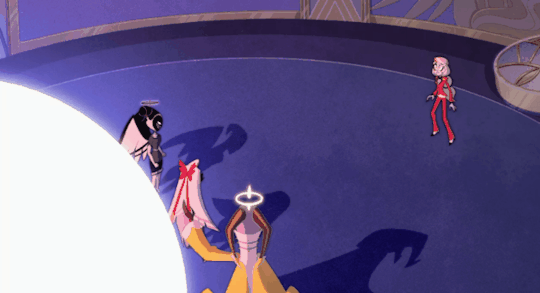

Still, this song has the characters' secrets come out, so that they can be dealt with. In future episodes we see Hell and Charlie do so, whereas Heaven and Sera refuse to. This is why season 1 ends with Hell's victory.
Still, why does Sera refuse to accept the truth? What is it that scares her so much?
Sera: They were uprising, Emily. It is my position as the head Seraphim to protect our people at all costs.
Sera fears the order might break, which could result in her loved ones suffering. In this sense, she is similar to Carmilla:
But if anyone knew, then all of Hell would rise to war
And who's to say who'd survive the fray?
I might lose the ones that I was killing for
That said, even if it is only temporary, Heaven's order is indeed lost throughout the song. This is shown by two visual motifs:
The metaphorical use of heights
The use of colors, especially blue and red
WHO HAS THE MORAL HIGH GROUND?
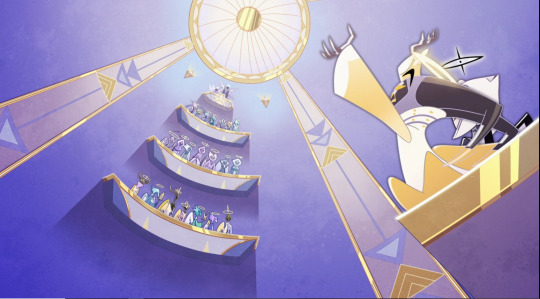
The seating in the courtroom is organized, so that it mirrors the characters' perceived morality:
Sera and Emily, as Seraphims and judges are at the very top
The other high ranking angels are the jury, so they are just below the two seraphims
Adam, Lute, Charlie and Vaggie are the two parts debating, so they are below the judges and the jury. Still, they are not on the same level. Adam and Lute are above Charlie and Vaggie.
This arrangement shows that Sera has no intention to be a fair judge, as she has already decided the Exorcist Adam has the moral high ground on the Princess of Hell. He is an angel and she is a demon. He is the first virtuous soul and she is Lucifer's daughter. He embodies the status quo, while she is trying to change it. So, Sera has already decided to favor Adam over Charlie. In other words, the moral high ground highlights not morality, but the influence Heaven has over Hell. It is nothing more, but the embodyment of their power dynamic.
Despite this, as the song starts things change in multiple ways:
1- Emily steps down
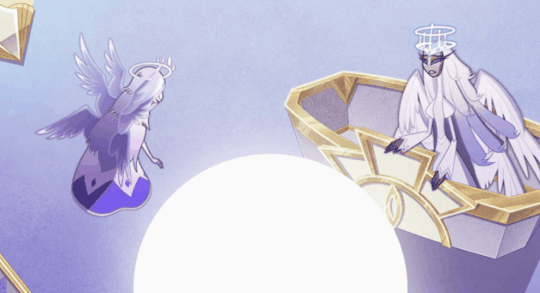
Emily empathizes with Charlie and gets down off the pedestal Sera has built for her. She is still above Charlie and Adam, but she invites the other angels to show mercy, to be just. This is because Emily strongly believes Heaven is a place where virtue and morality reign.
2- Adam and Lute look down on Charlie

Adam and Lute make their case and claim Hell is forever:
Adam and Lute: Did you forget that "Hell is forever"?
As they sing this part, they stand on the magical orb and look down on Charlie. They have the upper hand and judge her and the other demons as creatures inferior to angels. At this point, though, Adam flies down to threathen Charlie:

By doing so, he reveals the existence of the exterminations and shows that he himself is no different from a demon. So, Adam and Charlie are on equal footing.
3 - Emily reaches Charlie

The reveal of the Exterminations shocks Emily, who reaches the floor to better look at the destruction Heaven is causing. Her idealistic vision of Heaven gets shattered, so she is forced to re-evaluate the system and the current order. She stops positioning herself as higher than Charlie and goes down to better see things from her perspective.
4 - Sera flies down

Sera panics and hurries to Emily to convince her that what she has done is for the greater good. She is forced to step down and to confront the younger Seraphim on the floor:
Sera: You have to listen
It was such a hard decision
I wanted to save you, the anguish it takes to
Do what was required
Still, Emily refuses Sera's explanation and calls her out:
Emily: To think that I admired you
Well, I don't need your condescension
I'm not a child to protect
Was talk of virtue just pretension?
Was I too naïve to expect you
To heed the morals you're purveying?
As she does, she flies higher than Sera because she is showing more morality than her mentor:

5- Charlie and Emily gain the moral high ground

As Charlie and Emily sing together in anger and frustration, they jump on the magical orb. Their pose mirrors Adam and Lute's one, but their point is the thematical opposite:
Charlie and Emily: If Hell is forever, then Heaven must be a lie!
Adam and Lute claim "hell is forever", whereas Charlie and Emily answer that "if hell is forever, then heaven must be a lie". Not only that, but they say it looking down on Sera, who is supposedly the higher ranking angel and the judge.
Charlie starts the questioning at the very bottom, but in the climax she gains the upper hand. Sera should be at the very top, but in the end she is reduced to look up to the two girls from the floor.
The questioning starts as a farce and a demonstration of political power. However, Charlie's determination and Emily's sense of justice make it the real deal. Hypocrisy disappears and the truth becomes visible to everybody. Even if just for a moment.
6- Sera takes back control
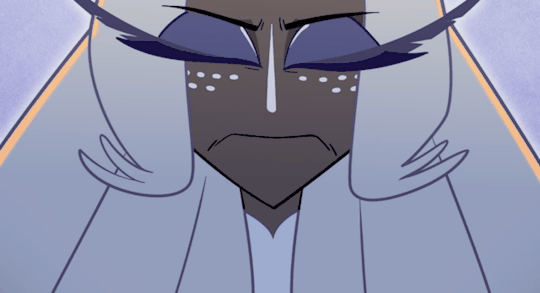
Sera uses Adam's reveal about Vaggie to re-assert order over the courtroom. She and Emily fly back to their seats and Sera is free to be the judge again. Her final decision is the one she was determined to make in the beginning:
Sera: I'm sorry… but this court finds that there is no evidence souls in Hell can be redeemed.
Sera refuses Charlie and Emily's pleas and goes back to the pre-established order.
RED DEVIL AND BLUE ANGEL
Charlie and Emily unmasking the truth about Heaven and Hell is highlighted also by the way red and blue are used throughout the song. In general, Hell and Heaven are color-coded. Hell is red and Heaven is blue. For example, Charlie and Vaggie wear red, whereas St Peter, Sera and Emily wear blue:

Not only that, but Sera and Emily's wings have blue details and shades. Lucifer is a Seraphim too, but his wings are red inside, as he is the titular devil:

That said, You Didn't Know breaks this color scheme to show how angels like Adam, Lute and Sera are behaving like devils. This clip of Sera makes it clear:

Hell's flames are mirrored in her eyes and make her look scary, when she is trying to be reassuring. A stark contrast with the blue and gold idealized imagery Emily has of her:

By the moment Charlie and Emily state their powerful come-back the colors are basically mixed. Just like the Princess of Hell (red) and the Youngest Seraphim (blue) stand together and share the same moral vision:
Charlie and Emily: If angels can do whatever, and remain in the sky
The rules are shades of gray when you don't do as you say
When you make the wretched suffer just to kill them again
Hell and Heaven are not red (black) and white (blue), but have shades (of gray). Just as Charlie and Emily sing this, the world around them changes to prove them right.
The two girls break the system and show clearly that:
Charlie is the one pursuing morality, as she is trying to protect people
Good and Evil are not so easily defined, as the angels behave like demons and demons show positive traits and virtues
Unluckily, this isn't enough to change things, as Heaven is stuck in their own rules:
Lucifer: Hohooo boy, Heaven, is not exactly as carefree as you might think. Yeah, they have rules, lots of rules, and they aren't very open minded as you'd hope.
A QUESTION TO BE POSED
The debate between Charlie and Adam is about the possibility or not to redeem souls in Hell. Deep down, though, it is really about something much more basic. Is it alright to question things? Every character has their own viewpoint on the matter:
Charlie: Well, if you know so much, what do you think it takes to get into Heaven?
Adam: Uhhh… well, uh… then why isn't he here then? Hm?
Emily: Yeah, why isn't he here?
Lute and Adam: There's no question to be posed
He's unholy, case closed
Charlie and Emily are genuinelly asking questions. They wanna know why some spirits end up in Heaven and why others do not. Adam and Lute, instead refuse to investigate things. Adam's question isn't real and it is just rhetoric used to prove a point. Lute directly states there is nothing to question. Charlie and Emily embody the theme, whereas Adam and Lute represent the anti-theme.
What about Sera? She is the negation of the negation, which is a thematic stance worse than the anti-theme. Charlie and Emily are ignorant, but want to know. Adam and Lute are in the dark, but they don't care to know.
Sera's sin isn't ignorance, though. It is knowledge:
Emily: Sera, tell me that you didn't know
Sera: I thought, since I'm older
It's my load to shoulder
Emily: No!
She knows about the exterminations and she knows the system isn't fair. Still, she refuses to question it. Not only that, but she prohibits others to ask questions:
Sera: Please…. if you start to question… you could end up like Lucifer. FALLEN.
She is the judge of a questioning, but doesn't allow questions. This shows how hypocritical the whole situation is. How can there be a questioning, when one can't ask questions? And if asking questions is prohibited, then the final answer will never change:
Lucifer: Heaven never listens! They didn't listen to me, they won't listen to you!
#hazbin hotel#hazbin hotel meta#my meta#asksfullofsugar#anonymous#charlie morningstar#sera hazbin hotel#emily hazbin hotel#adam hazbin hotel#lute hazbin hotel
71 notes
·
View notes
Text
Prowler Hobie x Miles Headcanons
Normally in fanarts Prowler Hobie is taller than regular Hobie, but in this au I'd like to think this Hobs is taller than Miles but shorter than regular Hobie (because every Prowler is shorter than their Spider-Man counterpart in my mind) (laughs in short Miles G)
This Hobs is from Miles universe Earth-1610B, so he's American and his style and fashion sense is more close to Miles'
Hobs fell for Miles twice. Once on their first meeting when Spider-Man webbed him up (but he didn't know it was a crush yet), and twice when he met Miles at Brooklyn Visions Academy before he found out he was Spider-Man.
This guy has so many hoodies. Does Miles eventually steal some? Yes (More like Hobs shoves some into his hands, in the name of upping his game. Totally not to give him boyfriend hoodies of course)
After Spider-Punk meets Hobs the first time, sometimes Hobie will randomly portal nearby wherever he is and start joking around with him / pulling him into shenanigans. I imagine their shenanigans play out like regular show episodes. Sometimes Miles gets pulled in too
The first time Hobs meets Miles G (Prowler Miles) they try to act cool / see who's the coolest in front of Miles because they both secretly have a vegeta complex and immediately start talking about tech and gear and then go to G's house to play Street Fighter and Tekken (Miles laughs and knows they're both nerds and weebs). Miles G is definitely trying to play the 'gotta make sure this guy is a good match for my bro' card here, and Hobs is like 'I can't believe Miles has rizz in every universe'
Canon event theory is flaky at best, but everyone knows every Prowler is fated to create the most god awful FL studio beats known to man. Hobs tries to impress Miles by playing some of his self produced music and it takes everything in Miles not to laugh or say its trash because Hobs has the biggest smile on his face and looks proud of himself
Them falling asleep with Miles' head on Hobs shoulder on the Metro train because they're too beat from a mission to swing / parkour back to their homes (Metrooooo)
Hobs shows Miles some of his graffiti art around the city while they're suited up, and that night Miles takes a risk and trusts him enough to lead him to his secret spraypaint mural of his uncle and the other spiders at the abandoned train station. Hobs is in awe and they have a heart to heart and Hobs helps him remaster some of the art and also add his own stuff too
Hobs starts showing up more and more around Miles, and Rio and Jeff think they're secretly dating. Rio and Jeff hit Miles with the 'Son we love you no matter who you love' and 'So you and Hobs huh?' And Miles does a record scratch in his head and says 'Wait what are we talking about right now??'
Cue Hobs with the "Its a pleasure to meet you Mr. And Mrs. Morales" and then when he sees the Morales' relax more, Hobs grins to himself like 'Yeah I got this in the bag'
When they're already dating and it's Miles' birthday, he takes Miles around the city to show him graffiti murals he made of Miles' face with Sunflowers and murals of Spider-Man. He ends the date with them on Miles' rooftop and Hobs takes out his Bluetooth speaker and Hobs starts rapping a song he made for Miles (and the beats he made are actually fire this time too!!) and Miles is awestruck. He was in love before, but he's even more in love with him now.
Combined team attacks (after Hobs alignment starts leaning more towards neutral/good) where Hobs throws Miles like an arrow towards enemies or Miles uses his webs to launch Hobs up in the air to do flips and attacks and stuff to defeat the villain of the week. Cue being surrounded by enemies and they're back to back in a fighting stance and when the first move is made they fight together effortlessly and so well it's almost like they're dancing. Cue the victory poses.
----
Hobs may have become the Prowler because he had to, or maybe he didn't have a choice, or maybe he did it because he had someone he had to protect, but ever since meeting Miles and being saved by his heroism, he's finally been given the one thing he's always ever wanted. A choice.
#punkflower#but make this hobie the prowler#back at it again with hobs and the sunflower 😌#love these two lmao XD#flowerpunk#hobie x miles#prowler hobie#hobart brown#miles morales#these two show up too: ->#hobie brown#miles g morales#atsv au#atsv#across the spiderverse#jjs-writing
59 notes
·
View notes
Text
What is a "Saratoga Split"?
This theory is such a reach that I debated even writing it down at all. But at the very least, it was a fun little history refresher! My theory: the “Saratoga Split” is a reference to the 1777 Battle of Saratoga from the American Revolution, and it’s foreshadowing either the rest of the household having to defend Guillermo against Nandor, or Guillermo choosing to leave Nandor. My reasoning is below.
The “Saratoga Split” could be seen as a throwaway moment, but there are too many strange things about it that stand out. First of all, I looked up the Saratoga Split and I can’t find a single mention of it anywhere, so I’m not sure it’s even a real hairstyle. Second, Guillermo doesn’t know the answer, so Nandor says the name very slowly and deliberately, twice. Third, Guillermo fully turns away from Nandor here (see screenshot below), so that we can see both of their faces - this is not the most natural thing to do in conversation, and feels intentional. Whenever one of them is fully facing away from the other, some secrets are usually brewing (see: the sound machine scene in ep1 or “I let you live” from the s3 finale).

Nandor’s love of battles and military history has been well-established throughout the show, and was emphasized in the prior episode, S5E7 “Hybrid Creatures”. At the beginning of “The Roast”, Nandor tries to engage with Laszlo by asking him a question about the 1759 Battle of Quiberon Bay, in which the British Royal Navy defeated the French Navy. Fast-forward to the “Saratoga Split” dialogue at the end. It’s said by Nandor, who a) canonically loves battles and b) already mentioned another battle earlier in the episode - a battle that is also from the 1700s and also involves the UK and France.
Quick refresher on the Battle of Saratoga: it’s widely analyzed by historians as a turning point in the American Revolution, because the American forces managed to defeat the British forces, thereby raising morale and convincing France to form an alliance with them. This French alliance eventually helped them win the war. The American forces were victorious in the Battle of Saratoga partly thanks to the leadership of Benedict Arnold - who was wounded in battle and later switched to the British side because he felt unappreciated. His name literally means “traitor” in America, despite all of his contributions towards the revolutionary effort.
The word “split” itself invokes division, rupture, separation, abandonment, etc. We know that Guillermo’s decision to be turned by Derek has already created an emotional divide between him and Nandor, whether or not Nandor knows the truth yet. We also know Guillermo is missing in S5E10, implying either a voluntary or involuntary separation, and the title of the episode is “Exit Interview”, implying someone leaving.
Assuming this “Saratoga Split” reference is intentional, I think it’s a nod from the writers to the viewers, and can be interpreted in two different ways.
1. It could be drawing a parallel between Guillermo getting the rest of the household on his side and America securing the French alliance. In this case, the “split” might refer to the fact that everyone has taken Guillermo’s side, leaving Nandor alone. The “alliance” between the rest of the vampires and Guillermo might end up being crucial in protecting Guillermo from Nandor’s anger when he finds out the truth about Guillermo's turning.
2. It could be drawing a parallel between Guillermo and Benedict Arnold. Guillermo served Nandor faithfully for so many years but Nandor still refused to turn him, so he ended up going to Derek, and his actions have been described as a betrayal by multiple characters. Nadja even calls him a “traitor” in S5E5 “Local News” - yes, it’s for a different reason, but fits in with the overall theme. In this case, the “split” would refer to Guillermo possibly choosing to leave Nandor and the household, the way Benedict Arnold left the American forces.
Anyway, time to pull myself out of this rabbit hole.
102 notes
·
View notes